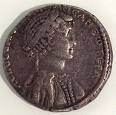

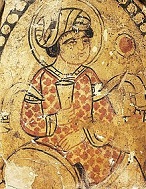















TLW's Egyptscope™ (Egypt Historyscope) |
By T.L. Winslow (TLW), the Historyscoper™ |
© Copyright by T.L. Winslow. All Rights Reserved. |
Original Pub. Date: May 15, 2018. Last Update: Nov. 3, 2018. |
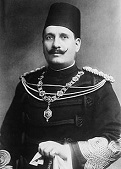









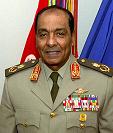
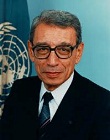
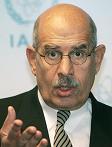

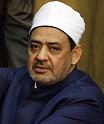
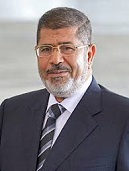

Westerners are not only known as history ignoramuses, but double dumbass history ignoramuses when it comes to Egypt and Egyptian history. Since I'm the one-and-only Historyscoper (tm), let me quickly bring you up to speed before you dive into my Master Historyscope.
On Sept. 2, 31 B.C.E. after Octavian is elected consul and declares war against Cleopatra, Octavian's admiral Marcus Vipsanius Agrippa defeats Antony and Cleopatra VII at the naval Battle of Aspium, er, Battle of Actium, a promontory in NW Greece in the Ionian Sea; each side has 500 war ships and 40K legionaries, but Antony's soldiers believe he has been bewitched (pussy-whipped?) and many refuse to fight; Antony's ally Herod the Great claims he can't help him because he has to keep the Nabateans in check; Cleopatra breaks through a line of Octavian's ships to avoid capture (thinking Antony is dead?), and Antony thinks with his head (nose?) and runs after her, leaving most of his fleet behind, insuring a big D, after which Herod sticks to his dental plan called avoidance and goes to Rhodes to offer his loyalty to Octavian, becoming his close brown-nosing friend; the D is really a tactical V since it allows Antony and Cleo to break out of an isolated position at Actium?; either way, Octavian now controls the East.

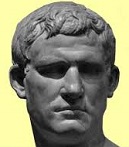




16 big game days, 2 superheroes, one very special family room? In summer 30 B.C.E. Julius Caesar's chosen heir Octavian (Gaius Octavius) (-63 to 14) marches his armies around the Aegean, through Asia Minor and into Egypt; in July Marc Antony (b. -83) defends Alexandria from Octavian's Gen. Marcus Agrippa (-63 to -12), but his men desert, he is told that Cleopatra is dead, and falls on his own sword; on Aug. 1 Octavian captures Alexandria, and annexes Egypt as the Roman Province of Egypt (ends 641 C.E.); the Roman V gives them direct access to the Malabar Coast in India, allowing them to begin importing precious black pepper; on Aug. 12 aging 39-y.-o. Cleopatra VII (b. -69), after trying unsuccessfully to pussy-whip Octavian and negotiate to keep her Ptolemaic kingdom intact and keep her kids, only to learn that she is to be brought to Rome in chains as a common POW commits suicide at age 39 in Alexandria with an asp (Egyptian cobra) in a fig basket, becoming Egypt's last pharaoh; William Shakespeare never calls it an asp, preferring the term "pretty worm of Nilus" in Antony and Cleopatra, Act 5 Scene 2: "Poor venomous fool, be angry, and dispatch"; Cleopatra's servant Charmion (Charmian) greets some messengers, who ask, "Was this well done of your lady?", answering "It is well done, and fitting for a princess/ Descended of so many royal kings", as portrayed by Isabelle Cooley in the 1963 film Cleopatra, with the line: "Extremely well, as befitting the last of so many noble rulers" - don't have to live like a refugee? No one is predictable, not even a huckster? In Aug. teen prom queen Ptolemy XV Caesarion (b. -47) is strangled, ending the last dynasty of ancient Egypt, the Ptolemaic Dynasty (began -305); Augustus orders the doors of the Temple of Janus closed for the 1st time since -235, indicating that Rome is finally at peace; the rest of Cleopatra's children are raised certified organic by Octavia; so much Egyptian loot fills Roman coffers that interest rates slide from 12% to 3%, increasing Octavian's popularity; up to 50 obelisks are shipped to Rome in huge specially-designed ships; Rome begins surpassing Egypt in intellectual supremacy?

In 40 C.E. Caligula brings an Egyptian obelisk akin to Cleopatra's Needle to Rome, where it looms over a circus that later witnesses much fun in the Sun with the pesky Christians, incl. St. Peter in 64-67?
In 41 C.E. during the reign of Claudius, Roman officials in Arabia report a small herd of centaurs in the remote mountain region of Saune, after which one is transported to Egypt, where it dies, and is embalmed in honey and sent to Claudius, who exhibits it in his palace in Rome; emperor Hadrian later keeps it in his imperial storehouse.
In 42 C.E. there are famines in Rome, Egypt, and Greece.
About 42 C.E. Mark the Evangelist allegedly begins preaching in pagan Alexandria, Egypt, founding the Coptic Orthodox Church of Alexandria during the reign of Nero, and converting many native Egyptians.
In 88 C.E. two Egyptian obelisks in honor of Domitian are erected in Benevento in front of the Temple of Isis.
In the 2nd cent. C.E. an Egyptian papyrus containing wisdom texts is written, revealing that the goddess Isis gave as much power and honor to women as to men, permitting them to own property, practice professions include medicine, and serve as witnesses, plaintiffs, and defendants in court.
In the 2nd cent. C.E. the Corpus Hermeticum ancient Greek-Egyptian wisdom texts are redacted in the form of dialogues with Hermes Trismegistus ("Thrice-Greatest"), launching Hermeticism in the West, with a basic belief in the Four Elements of the Universe, and the Seven Intermediary Planetary Spirits created by God to govern destiny; in ancient times the god Hermes was worshipped in the form of a square pillar with a head and beard, and the Caduceus was his symbol; "Seeing within myself an immaterial vision that came from the mercy of God, I went out of myself into an immortal body, and now I am not what I was before. I have been born in mind!"
In 600 C.E. due mainly to plague, the pop. of the Roman Empire is only 60% of its pop. in 500 C.E. Largest cities: Constantinople: 500K, Chang'an and Lyang in China, Ctesiphon in Persia, Alexandria in Egypt: 200K, Teotihuacan in Mexico: 50K; by this year there are 15M Zoroastrians, mainly in Persia; after the Muslim conquest of Persia in 656, the heat is on, and by the end of the cent. Muslim persecution shrinks their pop. to ?, and by the 21st cent. they're down to 250K.
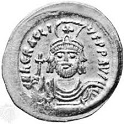
In 610 Gen. Priscus, supported by the exarch of Africa begins a conspiracy against "The Beard" (Phocas), sending an army by land which conquers Egypt, while a fleet from Carthage arrives in Constantinople and causes a popular revolt, after which the mob beheads Phocas and proclaims Heraclius (Heraklius) (Herakleios) I (575-641) (son of the African exarch) as Byzantine emperor #110 on Oct. 5 (until Feb. 11, 641), founding the Heraclian Dynasty (ends 711); he ends the use of Latin in his empire in favor of Greek; Khosrau II continues his war, taking the leading cities of Armenia and Cappadocia this year and next, while Heraclius is worrying about the Avars in the NW; Patriarch (610-38) Sergius I (-638) of Constantinople becomes his big backer, and a big promoter of Monothelitism.
In 616 the Persians give up on Constantinople and head for Egypt.
In 619 the Sasanian (Sassanid) Persians capture Alexandria from the Byzantines, and Egypt comes under Persian rule (until 629), restoring the Achaemenid Empire.


On Feb. 23-24, 628 (night) Khosrau II's treacherous eldest son (by Christian princess Shirin) Kavadh II (Sheroe) (Shiruya) (590-628) is released from captivity and proclaimed king #23 on Feb. 25 by some Persian nobles, and on Feb. 28 after remaining behind Persian lines for the winter, having ruled since 590 and extended the Sassanian Empire frontiers almost to the limits of the Achaemenid Empire, Khosrau II Parvez (Ever-Victorious) and his other 18 sons are murdered in the palace; Kavadh II makes peace with Heraclius I, restores the True Cross of Christ to him along with POWs, and agrees to evacuate all his conquests in Egypt, Palestine, Syria, Asia Minor, and W Mesopotamia; too bad, Persia took such a big bite out of the Byzantines that they are fatally softened up for the Arabs and Slavs; on Sept. 6 Kavadh II dies of the plague after a reign of a few mo., and on Sept. 6 his boy son Ardashir III (621-29) succeeds him as shah of Sasanian Persia (until Apr. 27, 630).
In 629 Sasanian rebel gen. Shahrbaraz (Shahrvaraz) (Pers. "the Boar of the Empire") (-630) makes an alliance with Byzantine emperor Heraclius, who gives him control of Egypt, ending Persian Sasanian control (begun 619); he then kills the tyke next Apr. 27 and usurps the throne, but is murdered after a reign of 2 mo., causing anarchy, allowing Byzantine emperor Heraclius I to finish conquering them, ending the Sixth Byzantine-Persian War (begun 603).
In 639 the Muslim Arabs under Gen. Amr ibn al-As (al-Aas) (583-664) overrun Mesopotamia and invade Egypt, conquering it in 642; yet more invade Armenia (ends 653).
In 640 the Arabs under gen. Amr ibn al-As siege and take the fortress of Babylon-in-Egypt on the E bank of the Nile in Egypt, and move toward Heliopolis.
On Nov. 4, 641 the Arabs under Gen. 'Amr ibn al-As (583-664) destroy the Byzantine army at the Battle of Heliopolis and siege the Egyptian capital of Alexandria; the Muslim conquest of Egypt causes Adulis (key to the trade route to India) to be closed to Abyssinia (Ethiopia), which is cut off from the rest of Christendom for the next eight cents; on Nov. 8 the Treaty of Alexandria, which seals the Arab conquest of Egypt expressly stipulates that the city's 40K Jews are to be allowed to remain, after which the last Byzantine troops evacuate the city next Sept. 17; too bad, the Arabs allegedly burn the 300K papyrus scrolls of the Library of Alexandria on orders of Caliph Omar to heat the public baths, the supply running out in one year, ending the great School of Alexandria that brought us all that math and science, and worse, the closing of the Mediterranean by Islamic pirates on endless jihad shut off the supply of papyrus to the West, forcing aging papyrus books to have to be replaced by more expensive parchment, causing 95% or more of classical Western works to be lost forever. too bad, after the Copts find out about being treated as 9th class and having to pay jizya, they start a long and hopeless resistance that peters out by the 9th cent; worse, while Persia manages to hold onto its language and culture, especially after work of 10th cent. Persian poet Firdawsi, Egypt is completely absorbed, and the pop. begins speaking Arabic instead of Coptic; the pop. of Egypt, which is 9M this year, reaches 80M by 2011, while the Coptic pop. slides from a majority (90+%?) to 10% (800K), going down fast; modern-day Muslim apologists who try to push the phony conception of jihad as an inner struggle but have to confront history like this of unprovoked invasion and takeover actually stoop to claim that these Egyptian Christians were really proto-Muslims because they were Arians and saw eye-to-eye on Christ's lack of divinity, hence they were just being liberated. :)
In 641 the garrison city of Fustat (Fostat) is founded by Muslim gen. 'Amr ibn al-'As (583-664) (a companion of Muhammad) as the capital of Egypt, housing the Amr Mosque (Mosque of Amr ibn al-As), the first mosque in Africa, built next year.
In the 8th cent. Alexandria, Egypt sinks beneath the Mediterranean Sea in Aboukir Bay; rediscovered in 1933.
In 710 the Arabs introduce sugar cane to Egypt; the Egyptians go on to develop clarification, crystallization, and refining methods, after which sugar cane cultivation spreads to S Spain by 755 and to Sicily in 950.
In 767 the ancient and disused Egyptian waterways across the 100-mi.-wide Isthmus of Suez (linking the Mediterranean and Red Sea) are filled in after an Arab invasion.
In 795 the Bashmurian (Peshmurian) Revolt of Coptic Christians in Bashmur, N Nile Delta against the Abassids over jizya ramps up (ends 830).
In 830 the Bashmurian Revolt in N Egypt of Christian Copts is crushed by Caliph Al-Ma'mun with the killing of large numbers of Cops and their families, after which a major persecution begins.
In 832 Caliph Al-Ma'mun orders the Great Pyramid of Giza in Egypt breached to search for knowledge and treasure, digging a tunnel near the traditional original entrance that is later called the Robbers' Tunnel.
In 868 the Tulunid Dyasty in Egypt and Syria (ends 905) is founded by Baghdad-born Ahmad ibn Tulun (-884) (son of a Turkish ghulam) after he uses his position as deputy-gov. of Egypt to build up an army of Turkish cavalry and African infantry and revolts.
In 879 the Mosque of Ahmad Ibn Tulun, the oldest mosque in Cairo is built; the 144K hard white limestone casing stones of the Great Pyramid of Gaza are stripped for this mosque, and other mosques and palaces.
In 904 the Abbasids under Gen. Muhammad ibn Sulayman al-Kabit invade Egypt and capture it from the Turkic Tulunids, ending their regime (founded 898) by next year and incorporating Syria and Egypt into the caliphate.
In 912 the Church of the Resurrection in Alexandria, Egypt is burned down by Muslims.
On May 28, 915 Egypt after is invaded from Tunafishia, er, Tunisia by Fatimid armies under Abul Qasim, they retreat to Raqqada after being defeated in Alexandria by an Abbasid army with Turkish archers.
In 935 Turkic slave soldier Muhammad ibn Tughj (882-946), AKA Ikhshid (Pers. "prince") arrives in Fustat, Egypt as the new Abbasid gov. (until 946), founding the Ikhshidid Dynasty (ends 969), defending Egypt against Fatimid raids and centralizing the govt.
In 939 a Muslim rising in Askalon plunders and destroys the Greek Orthodox Church of Mary.
In 956 Christian Nubia attacks Aswan in Egypt.
In 958 the Fatimids raid Morocco for the charmed 4th time (913-5, 920, 935) and defeat the Umayyads, securing control (until 960), then resuming their attack on Egypt.
In 969 the Shiite Ismaili Fatimids under gen. Gawhar al-Siqilli (928-93) extend their N African empire by invading and conquering Ikhshidid-controlled Egypt, then set their sights on Syria, taking Jerusalem and burning the Dome of the Holy Sepulchre, founding the Ism'ili Shiite Egyptian Fatimid Dynasty (ends 1171), denying the legitimacy of the Sunni Abbasid caliphate and wanting to be numero uno, eventually controlling Egypt, N Africa, the Hijaz, and most of Syria; Janhar el-Kaid founds the new capital of Cairo (al-Qahirah) ("the Conqueror") (modern-day pop. 9.5M/20.4M) 3 mi. N of the old capital of Fustat (founded 641) (which was taken on Aug. 5), although the latter remains the center of pop., commerce, and industry; the Qaramitas take advantage of the fall of the Ikhshidids and seize control of S Syria.
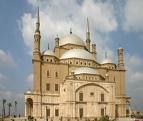
In 970 Al-Azhar (Arab. "most resplendent") Mosque in Cairo, Egypt is built by the Fatimids, becoming the first mosque in Cairo, churning out Shiite propaganda until 1171, when it is turned into Al-Azhar U., which becomes the #1 Sunni religious college.
In 972 N Africa is freed from Egypt by Cordoba, and the Fatimids relocate their capital to Egypt, reliquishing their N African possessions to the Zayrids (Zirids), who become govs., starting with Buluggin (Bologhine) ibn Ziri (-984), gradually going Sunni by the 1040s, and breaking away from the Shiite-eating Flies, er, Shiite Fatimids, and founding the Zirid (Zayrid) Dynasty in Ifriqiya in N Africa (ends 1148).


On Feb. 13, 996 caliph (since Dec. 21, 975) Abu al-Mansur Nizar al-Aziz Billah (b. 955) dies, and on Oct. 14 his son Al-Hakim bi-Amr Allah (985-1021) becomes Fatimid caliph #6 of Egypt (until Feb. 13, 1021), the first Fatimid imam born on Egyptian soil, deeming himself to be an incarnation of Allah and founding the Druze (Druse) sect of Islam, which mixes it with Greek philosophy (Pythagoreanism), Christianity Neoplatonism), and Judaism, along with a belief in reincarnation, while gaining a rep. for cruel and eccentric behavior, persecution of non-Muslims, and repudiation of orthodox Islam; he sponsors the Persian missionary Hamza ibn 'Ai ibn Ahmad (985-1021), who establishes the Druzes in Syria.

Walk like an Egyptian, way-oh-way-oh? Early in 1249 William II of Achaea captures the fortress of Monemvasia (Malvasia) in the Peloponnesus with the help of his Euboean vassals, then hooks up his 400 knights and 28 ships with Louis IX of France and his poorly organized Seventh Crusaders in Cyprus; in early June they land in Egypt, capture Damietta on June 4-6 (without a blow?), then wait for the Nile to subside before heading for Cairo; on Nov. 23 Sultan (since 1240) As-Salih Ayub (Al-Malik as-Salih Najm al-Din Ayyub) (1205-49), last Ayyubid ruler of Egypt dies in battle in Mansourah fighting the Crusaders, and his widow (a former Turkish Mamluk slave) Shajar (Shagrat) al-Durr (-1257) ("Tree of Pearls") conceals his death to rule in his name starting next year, becoming the first female ruler of Egypt since Cleopatra next May 2 (until Apr. 28, 1257); to save face, the Muslim leaders of Cairo make her marry former slave Aybak (-1257) and pretend that he's the ruler; the Kipchak Turkic Mamluks (Mamelukes) (Arab. "possessed", "owned") (white slave Turks and Mongols who earned the right to own weapons and are used as guards by the kaput Ayyubid sultans) go on to rule Egypt until 1517.
In 1250 the Mamluks and the Ayyubids sign an agreement granting the Mamluks sovereignty over the kingships W of the Jordan River, and the Ayyubids those E of the Jordan River.

Speaking of parts west? On Mar. 1, 1260 after the Mongol forces of Hulagu Khan combine with the Franks under Bohemond VI of Antioch and the Cilician Armenians under Hetoum I and capture Aleppo, they hook up with Hulagu's Christian Turkish gen. Kitbuqa (-1260) and capture Damascus, celebrating Xmas Mass in the Grand Mosque of the Umayyads (formerly the Cathedral of St. John the Baptist), profaning numerous mosques and sacking Jerusalem; An-Nasir Yusuf is killed by Hulagu, and the Ayyubid Dynasty (founded 1171) becomes kaput, continuing in name only, with the Muslim power center in Cairo not Baghdad or Damascus; meanwhile the death of Great Khan Mongke causes Hulagu to leave for Karakorum to help decide who will succeed him, and he leaves only 10K horsemen in Syria under Kitbuqa to occupy it, who raids as far S as Ascalon and Jerusalem, and stations a garrison of 1K in Gaza and another in Naplouse. On Sept. 3, 1260 after the Mamluks take advantage of the absence of Hulagu to move on them, the Mongols offer an alliance with the Franks, but Pope Alexander IV forbids it, and Count Julian Grenier of Sidon (-1275) (son of Balian I and Margaret of Brienne) causes the death of a grandson of Kitbuqa, causing him to sack Sidon, pissing-off the Christians so bad tht they allow them to pass through Crusader territory, 10K-20K Egyptian Mamluks defeat 10K Mongols in the Battle of Ain (Ayn) Jalut (Arab. "Spring of Goliath") in the Palestinian desert in the Jezreel Valley near Ein Harod, becoming the first Mongol D that isn't avenged, forever defining the SW limit of Mongol expansion as the Tigris River; Kitbuqa is executed; Syria suffers severely from the Mongol invasion, worsened by subsequent invasions in 1281 and 1299; the Egyptians use portable hand cannon (midfa) using gunpowder cartridges charged with 2-3-15 (sulfur-carbon-saltpeter) gunpowder; on the way back to Cairo Al-Zahir al-Malik Baybars (Baibars) (Arab. "panther") (1223-77) AKA Abu al-Futuh (Abu l-Futuhat) (Arab. "father of conquest") murders Sultan Qutuz, and becomes Bahriyya sultan #1 of the Mamluk Empire (until July 1, 1277); the Kipchak Turkish Mamluks (Mamelukes) (Arab. "possessed", "owned") seize control of the Egyptian sultanate, ruling Egypt until 1517, and continuing as vassals of the Ottoman Empire until 1811, becoming known for kicking the Franks out of Palestine, and kicking the last Crusader's butt out of Asia; the Bahriyya (Bahri) Sultanate of the Mamluk Empire (ends 1382) is founded, becoming the leading Muslim state, integrating and ruling the Syrian provinces in 1271-1516 while recruiting Mamluk soldier-slaves from the Caucasus, which causes ethnic tensions between Turks and Circassians (known for their beautiful babes); Cairo becomes the richest city W of the Indus River until 1300, with public works erected by exploited peasants; the usual form of succession is assassination; Christian participation in the 1258 Mongol invasion of Baghdad et al. cause the Muslims to begin a persecution, ushering in a "devastating reversal of Christian hopes... [and] the... decisive collapse of Christianity in the Middle East and much of Africa" (Colin Chapman); by the middle of this decade Western Christians wake up and begin accepting Mongol feelers about a Franco-Mongol Alliance against the greater threat of the Muslims, the Mongols promising them Jerusalem in return for cooperation; too bad, despite several pro-Christian Buddhist Mongol khans sending embassies, it never happens, perhaps because the Christians demand their conversion first, giving Islam time to slam-dunk and convert them.
In 1354 Muslim mobs in Cairo, Egypt plunder and demolish several Christian churches incl. the Church of Fahhadin, a Church in Bataq al-Tokruni, and the Convent of Nehya in Djizah.
In Mar. 1513 the Portuguese under Alfonso de Albuquerque unsuccessfuly try to capture Aden on the Red Sea coast from the Mamluks; he returns to India and defeats the kingdom of Calicut.
Jerusalem changes hands for the ???th time, this time for four centuries? On Aug. 24, 1516 the Ottomans under Selim I defeat the Mamluks at the Battle of Marj Dabiq (Marjdabik) (Marg Dayek) 26 mi. N of Halab (N of Aleppo) in Syria; the Morons, er, Mormons, er, Mamluks refuse to use gunpowder and artillery, calling it a "dishonorable weapon", relegating it to inferior units while taking on the Ottomans with valor and elan instead; Selim I then takes Aleppo, followed on Sept. 26 by Damascus, then Palestine, incl. Jerusalem (3rd most holy city in Islam) on Dec. 28; the Mamluk empire in Syria (founded 1250) ends, and the gunpowder-toting Automatic Ottomans rule the roost; on Dec. 30 Sultan Selim I secretly visits Jerusalem for devotions, then annexes all of Syria and moves on to Cairo.

On Jan. 20, 1517 the Ottomans under sultan (since May 26, 1512) Selim I Khan "the Grim" (1465-1520) conquer and sack Cairo, and finish conquering Egypt from the Mamluks, occupying Cairo on Apr. 13, after which they conquer Mecca and the other holy places of Arabia, even (gasp) Nazareth; the Mamluk Empire (founded 1250) is kaput, but the Mamluks are retained as an Egyptian ruling class as vassals; Yemen is annexed to the Ottoman Empire; Grim I becomes the first caliph of the entire grim Islamic world.

On May 19-20, 1798 the French Invasion of Egypt (ends 1801), Napoleon's most romantic adventure begins after he reconnoiters a British force under Commodore Horatio Nelson that was scattered by a storm, and his dismasted flagship HMS Vanguard secretly sails for Egypt from Toulon with 38K men, incl. a boatload of 167 savants (scientists and mathematicians) (Monge, Berthollet, Fourier), incl. Orientalists from his new Institut d'Egypt (which settles in Cairo on Aug. 22) in a fleet of 300 transport ships, 13 ships of the line and seven frigates (28K men), with vague grandiose plans of conquering all of the East like Alexander the Great, starting with the Ottoman Empire, cutting off British access to India; on June 6 they arrive at Malta, and after being refused entrance of more than two ships at a time and enjoying inside help from the Maltese, take it by June 12, expelling the 322 Knights of Malta (St. John) (Hospitallers) (whose French members wouldn't fight French troops) still defending it under grandmaster Ferdinand von Hompesch, who leaves for Trieste on June 18, and resigns next July 6; Nappy frees 2K Muslim slaves, and abolishes all religious orders on the island, and writes to the Bey of Tunis to boast of his favor to Islam, then reforms their govt. and steals their library and treasures (pissing-off Tsar Paul I, who is also a grandmaster, and was trying to finagle the first Russian warm water port there); on July 1 after slipping by Nelson's clueless fleet on the night of June 22-23, Nappy lands 5K troops in Alexandria, Egypt, capturing it by July 2, then landing the rest of his troops, giving a speech to the Egyptian crowd with the soundbyte "We are the true Muslims", trying to sell them on his being a fan of Muhammad, and hinting he might convert to Islam along with his troops in order to win the clerics of Al-Azhar seminary over, which they don't buy; after kicking the butts of Murad Bey and his best cavalry on July 13 in the Battle of Shubrakhit, Nappy's troops march through the grueling desert and defeat Murad Bey's Mamluks at the Battle of the Pyramids on July 21, capturing Cairo after losing only 30 KIA and 300 wounded vs. 3K Mamluk casualties; back in Britain they finally learn of Nappy's invasion from French newspapers on July 12; meanwhile Nelson's British fleet reaches Alexandria on June 29, then goes W instead of E, and swings back, sailing along the S coast of Crete and back to Syracuse on July 19, never finding Nappy; on July 25 Napoleon defeats 10K Turks supported by the British at the Battle of Aboukir (Abu Qir) (Abukir) Bay (14.5 mi. NE of Alexandria), making him master pharaoh of Egypt; Murad Bey retreats to Upper Egypt, and Ibrahim Bey to Palestine; never fear, after heading for Greece, and receiving news of the French position on July 29, on Aug. 1-2 the British navy under Nelson finally arrives back in Alexandria to save the day, and sinks most of the French fleet (emptied of troops) in Aboukir Bay in the Battle of the Nile (only two of 13 French ships of the line escape, while no British ships are lost), cutting Napoleon off from France, which ends his threat of conquering India and the East, but only pisses him off into invading Palestine and Syria?; the 98-gun line-of-battle ship Fighting Temeraire is captured by the British, later gaining fame in the 1805 Battle of Trafalgar; the USS Constellation, commanded by Commodore Truxton captures the French frigate L'Insurgente; French capt. Aristide Aubert Du Petit Thouars (1760-98) of the Tonnant forces HMS Bellerophon to lower its flag, forces HMS Majestic to break off combat, then dies in a bucket filled with wheat with b oth of his legs and one arm blown off, commanding to the end, his last order being to nail the flag of his ship to the mizzen-mast and never give up the ship, which is later captured; meanwhile in July the suddenly-the-old-world-changes Rosetta Stone is found in Qayitbey Castle in the small Egyptian village of Raschid (Rosette) by French capt. Pierre-Francois Blouchard, who reports it to French Gen. Jacques-Francois de Menou, Baron de Boussay (1750-1810), who, on Nappy's orders to be friendly with the natives feigned conversion to Islam under the name 'Aly Napoleon Bonaparte, and married Egyptian woman Sitta Zoubeida, daughter of a bathhouse keeper whom he mistakenly believed is of the Egyptian aristocracy because she claims to be a descendant of Prophet Muhammad; a 36-in. piece of black basalt containing a decree of the Egyptian priests of Ptolemy V Epiphanes (-205 to -181) in parallel hieroglyphics, demotic and Greek characters, it proves the key to the lost art of reading hieroglyphics.
On May 10, 1799 the Damanhur Massacre 100 mi. NW of Cairo, Egypt sees a revolt against the French viciously crushed by French Gen. Lanusse, killing 1.5K and burning the area down.

On Mar. 14, 1805 Albanian former tobacco vendor and Ottoman army lt. Mehmet (Muhammad) Ali (1769-1849) becomes gov. of Egypt, and pasha 2 mo. later on May 17 (until 1848); modern Egypt is born.



On Mar. 31, 1807 after Britain declares war on Turkey to protect their route to India and invades Egypt, Mehmet Ali, with the support of the Mamluks defeats the British at the Battle of Rosetta (Rasheed), and the British agree to withdraw from Egypt incl. Alexandria on Sept. 19; meanwhile on Feb. 19 the British fleet under adm. Sir John Thomas Duckworth (1747-1817) forces the defenses of the Dardanelles and anchors off Constantinople for the first time in history despite the Turks firing the 1464 Great Turkish Bombard (Dardanelles Gun), which kills 28; on Feb. 24 the Russian navy under adm. Dmitri Nikolayevich Senyavin (1763-1831) reaches the Dardanelles and captures the island of Tenedos in Mar., blockading the straits and cutting off supplies to Constantinople; too bad, Duckworth loses 600 men to shore battery fire, and refuses to join with Senyavin's fleet on an expedition to Alexandria, which turns out bad; meanwhile the blockade causes the Janissaries to revolt against reformer sultan (since 1789) Selim III (b. 1761), and imprison and despose him in favor of his nephew Mustafa IV (1779-1808) (son of Abdul Hamid I), who becomes Ottoman sultan #29 (until July 28, 1808), and orders the blockade broken by his navy, causing the naval Battle of the Dardanelles on May 11, and the naval Battle of Mount Athos (Monte Sancto) (Lemnos) on June 19-22, which are both Russian Vs, the Turks losing a third of their fleet.

On Mar. 1, 1811 at the request of Ottoman sultan Mahmud II, Macedonian-born Albanian-speaking Egyptian pasha (since May 17, 1805) Mehmet (Mohammed) Ali (1769-1849) destroys the greater part of the rebellious Mamluk Beys when he invites 470 of them to a banquet in honor of his son Tusin at the Citadel in Cairo, then massacres them, sending his troops to rout their forces; the Mamlukes (Mamelukes), who have been powerful in Egypt since 1250 are kaput; Mehmet Ali goes on to modernize and Westernize Egypt, nationalize and steal land from peasants, and set up armament factories and a navy, uttering the soundbyte: "I am well aware that the Ottoman Empire is heading by the day toward destruction... On her ruins I will build a vast kingdom... up to the Euphrates and the Tigris."
In 1820 Egyptian pasha (since May 17, 1805) Mehmet (Muhammad) Ali (1769-1849) begins an expedition (ends 1821) to conquer N Sudan, Nubia, Sanar, and Kordofan to gain water, land, gold, and Nubian slaves, and open the way to Ethiopia and Uganda.
In 1821 having secured Sudan, heavy-handed Egyptian pasha Mehmet Ali sends his son Ibrahim Pasha to found the city of Khartoum (Arab. "elephant's trunk") (modern-day pop. 5M) at the junction of the Blue and White Nile Rivers 15 mi. N of the ancient city of Soba as an outpost for the Egyptian army, becoming a center of the slave trade; in 1830 it becomes capital of Egyptian Sudan; eventually the White Nile junction moves several mi. to the N; meanwhile Mehmet's forces begin capturing slaves from the Nuba Mts. W and S of Sudan, forcing them into the Gihadiya foot regiment.
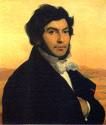
In 1821 French polyglot philologist Jean-Francois Champollion (1790-1832) (prof. of history at the Lyceum of Grenoble since age 19) finally cracks Egyptian hieroglyphics using the Rosetta Stone (discovered in 1799), and in 1824 is sent by Charles X to Italy to study Egyptian antiquities in their museums, after which in 1828 he goes to Egypt for more study.
In 1824 after the Turks seize the island of Ipsara from the Greeks but are defeated at Mitylene, Turkish sultan Mahmud (Mohammed) II asks for aid from Egyptian pasha Mehmet Ali against the pesky Greeks, and he agrees in return for the promise of Crete and other Turkish possessions; the Egyptians capture Crete then invade Morea (Peloponnesus), capturing it by 1826; the siege of Missolonghi (begun 1821) is ended, with the loss of Lord Byron (1788-1824) on Apr. 19 of fever.

In 1825 Egyptian gen. Ibrahim Pasha (1789-1848), son of Mehmet Ali commands an Egyptian expedition to the Peloponnese (ends 1828), which commits atrocities against the Greek pop., causing him to be the most hated man in Europe; Missolonghi, Greece is sieged again (until 1826).

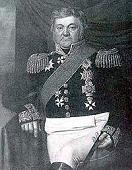
On July 6, 1827 after the Turks enter Athens, Britain, Russia, and France sign the Treaty of London, agreeing to force a truce on the Ottoman sultan, demanding an armistice and a permanent settlement of the Greek-Turkish War, with Greek self-govt. under nominal Turkish suzerainty, but Sultan Mahmud II refuses, and the British begin a peaceful blockade of the Egyptian fleet aiding Turkey against Greece; when the Egyptians attempt to break the blockade, on Oct. 20 the 26-ship British, French and Russian alliance under big heroes Adm. Sir Edward Codrington (1770-1851) of Britain, Russian Adm. Dmitri Senyavin, and Dutch adm. Login Petrovich Geiden (Lodewijk Sigismund Vincent Gustaaf van Heiden) (1772-1850) defeats and destroys the 82-ship Turkish-Egyptian navy of Mehmet Ali along with their feared fortress at the Battle of Navarino Bay in the SW Peloponnesus at Pylos, Greece, insuring Greek independence; Mikhail Lazarev is promoted to rear adm. for his achievements in the battle, and is put in charge of the Dardanelles blockade in 1828-9, made a cmdr. of the Baltic Sea Fleet in 1830, followed by chief of staff in 1832.


On Apr. 27, 1831 Charles Albert (1798-1849) of the line of Savoy-Carignan becomes king of Sardinia-Piedmont (until Mar. 23, 1849), Macedonian-born Albanian-speaking viceroy (since 1805) Mehmet (Mohammed) (Muhammad) Ali (1769-1849) demands the Ottoman Empire give him control of Arab Greater Syria (Syria Vilayet and Alepoo Vilayet) as a reward for his assistance against Greece in Crete, which is refused, resulting in the First Egyptian-Ottoman (Turco-Egyptian) (Syrian) War (ends 1833). On June 28, 1832 Egptian forces under Mehmet Ali's son Ibrahim Pasha retake Damascus, which has been under Egyptian control since 1516 (until 1841), giving them control of all of Syria, after which they halt while Mehmet Ali tries to negotiate with the sultan, and when that fails, they march into Anatolia, threatening Konya, which is captured on Dec. 21. In spring 1833 England, France, and Russia conclude an armistice with Egypt for the evacuation of Anatolia (Asia Minor); Mehmet Ali now rules all of Egypt and Syria, and is proclaimed as the "Alexander of two horns", founding a dynasty that rules Egypt until 1952.

The original Rael? In May 1832 the new free-love Saint-Simonian Socialist religous sect of Barthelemy (Barthélemy) Prosper Enfantin (1796-1864) (who wears a breast badge titled "Pere", claims to be the Chosen of God, and sends emissaries out looking for his Female Messiah) is shut down by the French govt., and he ends up going to Egypt, where he tries to stir up interest in starting a Suez Canal before returning to France and going bourgeois.

On June 28, 1832 Egyptian forces under Mehmet Ali's eldest son Ibrahim Pasha (1789-1848) retake Damascus, which has been under Egyptian control since 1516 (until 1841), giving them control of all of Syria, after which they halt while Mehmet Ali tries to negotiate with the sultan, and when that fails, they march into Anatolia, threatening Konya, which is captured on Nov. 21, causing Sultan Mahmud II to send a large army to stop them. On Dec. 21, 1832 the Egyptians under Ibrahim Pasha defeat the Turks at the Battle of Konya in Asia Minor 150 mi. S of Ankara on the W edge of the Plain of Lycaonia, opening their way to Istanbul, causing the sultan to beg for help from Britain and France, who turn him down because they're preoccupied in Belgium, leaving him no choice but to approach former enemy Russia, which unexpectedly accepts, sending 18K-40K men, which causes the Egyptians to back down and begin negotiating with the sultan; for this Greek ally Nicholas I of Russia forces the Turks to give him shipping rights - the road is clear for the Onassises?
In 1832 the Cigarette is invented by an Egyptian artilleryman in the Egyptian-Turkish War after first inventing the use of paper tubes for holding cannon gunpowder rounds.
In spring 1833 England, France, and Russia conclude an armistice with Egypt for the evacuation of Anatolia (Asia Minor); Mehmet Ali now rules all of Egypt and Syria, and is proclaimed as the "Alexander of two horns", founding a dynasty that rules Egypt until 1952.
In May 1833 after Anglo-French diplomatic pressure to make the sultan order the Russians to withdraw from Istanbul, along with guarantees against further Egyptian invasion, the Convention (Peace Treaty) of Kutahya (Kütahya) is signed, ending the Egyptian-Ottoman War (begun 1831), ceding the Ottoman provinces of Syria and Adana to Egypt, with Ibraham Pasha as gov.-gen.; too bad, the settlement satisfies neither party, leading to a new war in 1839.
On May 19, 1834 the 1834 Arab Revolt in Palestine begins over attempts at conscription into the Egyptian army of Mehmet Ali, causing Qasim clan head Qasim Pasha al-Ahmad (-1834) of Jabal Nablus to rally the Arab clans and notify Egyptians officials that they won't supply any more troops, causing Mehmet Ali's son Ibraham Pasha to send troops, after which Qasim leads his forces from Nablus, aided by the Abu Ghosh clan, entering Jerusalem on May 31, attacking Christians and Jews until Ibrahim's Egyptian army routs them in June, capturing and executing Qasim; the whole affair raises Arab consciousness and creates the first Arab Palestinian consciousness.

On June 24, 1839 after Mehmet Ali informs Britain and France on May 25, 1838 that he intends to declare independence from the Ottoman Empire, which they try in vain to stop, the Egyptians under Hafiz Pasha are badly defeated at the Battle of Nizip (Nezib) (Nessib) in S Syria (Lebanon) by Mehmet Ali, and on July 1 Ottoman sultan (since 1808) Mahmud II (b. 1785) dies of TB, and his Euro-educated French-speaking son Abdul Mecid (Mejid) I (1823-70) becomes Ottoman sultan #31 (until June 25, 1861), after which the entire Turkish fleet under Adm. Ahmed Fevzi Pasha sails to Alexandria and surrenders to Mehmet Ali on the pretext that the new sultan's advisers are owned by Russia, leading to the Second Egyptian-Ottoman (Turko-Egyptian) (Syrian) War (ends 1841), with a British-Austrian expeditionary force occupying Beirut and Acre and forcing Mehmet Ali to submit off Alexandria; on Nov. 3 under British pressure the sultan issues the Noble Rescript (Noble Edict of the Rose Chamber), declaring an end to corruption and arbitrary rule (e.g. instant death at will), and inaugurating the Tanzimat ("reorganization") Era of the Ottoman Empire (ends 1876), trying to continue his daddy's Westernization and modernization program while encouraging Ottomanism and discouraging nationalism, which, as Westerners also find out, can't be stopped; reforms start with abolition of public slave markets in the 1840s, outlawing of the turban in favor of the fez, and eventually incl. secularism and decriminalization of homosexuality, which only pisses-off the hardcore Muslims more, leading to a reactionary movement that resists all reforms.
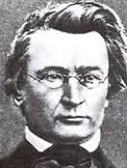
In 1842 at the recommendation of Alexander von Humboldt, German (Prussian) archeologist-Egyptologist Karl (Carl) Richard Lepsius (1810-84) is commissioned by Friedrich Wilhelm IV of Prussia to lead an expedition to Egypt and Sudan to take up where Champollion left off, reaching Giza in Nov. and discovering 67 pyramids and 130 noble tombs, visiting Naqa next year and reaching as far S as Khartoum before traveling up the Blue Nile to Sennar in Nubia, then reaching Thebes on Nov. 2, 1844, returning to Europe in 1846, after which Lepsius pub. his 12-vol. masterwork "Monuments from Egypt and Ethiopia" (1849), making him the father of modern Egyptology, coining the term "Book of the Dead" (Totenbuch). On Apr. 15, 1866 after returning to Egypt, he discovers the Table of Canopus (Canopus Stone) (Decree of Canopus), a record of a great assembly of priests in Canopus, Egypt in 238 B.C.E., which serves as a double-check on the trans. of the Rosetta Stone.

On Mar. 2, 1848 Muhammad Ali's eldest son Ibrahim Pasha (1789-1848) becomes wali and unrecognized khedive of Egypt and Sudan, dying 4 mo. later on Nov. 10.

On Aug. 2, 1849 Mehmet Ali (b. 1769) dies, and on Nov. 10 his horse-loving grandson Abbas I Helmi (1812-54) becomes pasha (ruler) (viceroy) of Egypt (until July 13, 1854).

In 1851 French Egyptologist Francois Auguste Ferdinand Mariette (1821-81) discovers the ruins of the Serapeum of Saqqara in Saqqara, Egypt, incl. the cool sarcophagi of the Apis bull, and breaks into the tomb on Nov. 12, finding lotsa loot; the French govt. later strikes a deal to share his finds 50-50 with the Egyptian govt., allowing him to found the Egyptian Dept. of Antiquities.

Look at him, do you need a rhyme? The bachelor premieres on Egypt TV Friday at 9? On July 13, 1854 Egyptian pasha (viceroy of Egypt) Abbas I Said (b. 1813) is murdered by his slaves, and his European-educated son Mohammad (Mohammed) Sa'id Pasha (1822-63) succeeds him as wali of Egypt and Sudan (until Jan. 17, 1863), curbing the influence of sheikhs, establishing the Bank of Egypt, opening Egypt's first std. gauge railway, wearing European dress and attempting rapid modernization of Egypt, becoming the Suez Canal pasha.
In Jan. 1855 Egypt abolishes the Muslim jizya (poll tax) on non-Muslims, and begins promulgating a new penal code.
Spirit genocide, or This is how a heart breaks? In 1855 English-born Dr. Isaiah Deck of New York City proposes using recycled Egyptian mummies for newspaper; in 1860 Augustus Stanwood of Gardiner, Maine uses them to manufacture heavy brown wrapping paper for meat; they are also used to fuel railroad engines - Denial is a river in Egypt?
In July, 1861 the federals impose a naval blockade on the South, which had already imposed a voluntary embargo on shipments of cotton in a vain attempt to make the Euros recognize them, creating the Lancashire Cotton Famine in Lancashire County, England starting in Oct., which until this year got 85% of its raw material from them, and by Dec. 1862 puts 485,434 workers on relief at a cost of $50M; despite some cotton reaching them in 1863, normal shipment levels do not resume until after the end of the U.S. Civil War; the embargo backfires on the South two ways, causing cotton workers to prefer hardship to living on the proceeds of slavery and hardening them against the Confederacy, and by driving the price of raw cotton up from 7 to 31 pence a pound by 1864, stimulating new growers in Egypt, India (Bombay), Brazil, and Australia; their support of the Union despite all keeps the British govt. from ending the blockade.

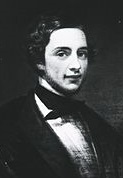
On Jan. 20, 1862 Am. antiquities dealer Edwin Smith (1822-1906) purchases the Edwin Smith Papyrus from Egyptian dealer Mustapha Aga in Luxor, Egypt, becoming the oldest medical text to survive to modern times, dated to 1,600 B.C.E.; he comes into temporary possession of another medical papyrus which is purchased in 1873 by Georg Moritz Ebers.

On Jan. 17, 1863 pasha (since 1854) Mohammad Sa'id (b. 1822) dies, and since his heir presumptive Ahmad Rifaat drowned in the Nile River in 1858, on Jan. 19 his nephew (Ibrahim Pasha's son) Ismail (Ismael) (Isma'il) Pasha the Magnificent (1830-95) becomes pasha of Egypt (until June 26, 1879), pursuing a rapid industrial-economic development and urbanization program , which is hampered by his personal profligacy, uttering the 1879 soundbyte: "My country is no longer in Africa; we are now a part of Europe. It is therefore natural for us to abandon our former ways and to adopt a new system adapted to our social conditions."

In 1863 Riga, Latvia-born German explorer Georg August Schweinfurth (1836-1925) goes to Africa, exploring Ethiopia and Egypt incl. the Red Sea, the Nile River, and Khartoum (until 1866); in Jan. 1869 the Alexander von Humboldt Foundation sends him on a scientific mission from Khartoum up the White Nile to Bahr-el-Ghazal through the Congo-Nile watershed to Mangbetu (Monbuttu) cannibal country, where he discovers the Uele River on Mar. 19, 1870, which he surmises is independent of the Nile and part of the Chad system, discovering the Aka (Bayaka) (Babenzele) pygmy people before returning to Khartoum in July 1871, becoming the first white Euro to prove the existence of African pygmies.
In 1866 Ismail Pasha of Egypt is granted rights of primogeniture by the Turkish sultan.
In June 1867 Egyptian pasha Ismael acquires the Persian title of khedive (pr. kuh-DEEV) from the Ottoman sultan to give him a higher status than other Ottoman govs. (ends 1914).
In 1868 the British send an armed expedition to Ethiopia which captures Magdala (Makdala) on the Gulf of Aden; Egypt occupies Bogos in Eritrea until 1884), pissing Ethiopia off.


In Oct. 1869 French steamer Louise-et-Marie becomes the first oceangoing vessel to sail through the 103-mi.-long, 656-ft.-wide, 30-ft.-deep Suez Canal from the Mediterranean to the Gulf of Suez (Red Sea), completed by Count Ferdinand de Lesseps (1805-94) at a cost of $105M; on Nov. 17 after an Egyptian frigate runs aground 8 mi. from Port Said, and is cleared only 5 min. before a multinat. fleet of ships sails through, it is officially opened for navigation by French empress (wife of Napoleon III) Eugenie Marie de Montijo (1826-1920) (famous for her waterfall hairstyle), with reps. of almost every European royal family in attendance; with the "Highway to India", England can now rule over her "jewel" India a lot easier and cheaper; the port of Brindisi in S Italy makes a comeback as a port of call for steamships operating to-from the Orient; the city of Aleppo, Syria at the end of the Silk Road sees its trade diverted to the sea, causing it to begin a slow decline.

In Feb. 1870 Egyptian troops led by British Gen. Sir Samuel White Baker (1821-93) fight their way from Khartoum up the White Nile, capturing Gondokoro (750 mi. S of Khartoum) by next June, establishing a few military posts along the way in country dominated by Arab warlords who have turned 90% of the black pop. from Darkest Africa into money-making slaves.

Christmas Eve in Cairo this year is something special? On Dec. 24, 1871 Giuseppe Verdi (1813-1901) debuts his opera Aida (Arab. "reward, present") at the Khedivial Opera House in Cairo, with libretto by Antonio Ghislanzoni, conducted by Giovanni Bottesini; his #2 masterpiece after 1887's "Otello"?; based on a scenario by French Egyptologist Auguste Mariette; commissioned by Egyptian khedive Ismail Pasha for 150K francs; pharaoh's daughter Amneris loves hunky capt. of the guard Radames, who really loves Ethiopian hot chocolate slave Aida, daughter of king Amonasro, who invades Egypt to rescue her, and is defeated by new Egyptian CIC Radames, who is betrothed to Amneris as his reward, while Amonasro conceals his identity to survive after Radames gets all prisoners except him and Aida freed; too bad, Radames is seduced on his wedding day by Aida on orders of Amonasro into betraying his country by giving up his army's location and letting him and Aida escape after high priest Ramfis blows the whistle, after which he is condemned to being buried alive in a tomb, only to discover Aida waiting for him in the cooler to make some hot fudge sundaes in eternity; not written to celebrate the opening of the Suez Canal because Verdi doesn't write "occasional pieces"; Act 3 opens in front of a temple of Isis on the bank of the Nile.

In 1871 after being kicked out of Afghanistan in 1868, moving to Egypt and founding the Masonic Lodge of Cairo and being kicked out of the Scottish Masonic Lodge for atheism, then becoming grand master of the French Grand Orient, pan-Islamic Shiite activist Jamal al-Din al-Afghani (1839-97) moves to Egypt (until 1879), going on pretend to be an Afghani in order to mix with Sunnis in a life devoted to waking Muslims to the Euro (esp. British) threat until he is exiled, then preaching solidarity in Turkey, London, Paris, Moscow, St. Petersburg, and Munich before being invited in 1890 to come to Iran by Shah Nasser al-Din, who has him arrested after 7 mo. and exiled after agitating against him for selling out to Europeans, then moving to Istanbul in 1892 after an invitation from Sultan Abdulhamid II, living there until his death from throat cancer on Mar. 9, 1897.
In 1874 the Ethiopian-Egyptian War (ends 1876) sees Ethiopia and Egypt go to war over the disputed district of Bogos after Ismai'l Pasha of Egypt annexes Darfur in 1875 and attempts to expand to the whole length of the Nile River, bumping up against Ethiopian emperor (since 1872) Yohannes IV, resulting in the Battle of Gundet on Nov. 16, 1875, in which the Ethiopians ambush the outnumbered Egyptians in a narrow mountain pass, routing them, after which the Egyptian suppresses the bad news and invades again from the N, resulting in the Battle of Gura in Eritrea on Mar. 7-9, 1876, which is another D, ending the war.
In Apr. 1876 the khedive, having squandered all the money he received for his shares of the Suez Canal causes Egypt to declare bankruptcy and suspend interest payments on a foreign debt of £68.5M and a floating debt of £23M; the internat. Caisse de la Dette Publique is put in charge of Egyptian finances, causing the natives to get restless and cry "Egypt for the Egyptians".
In Jan. 1878 the 70-ft.-long. 200-ton Egyptian obelisk Cleopatra's Needle (built in Heliopolis in -1460) is towed by the steamship Anglia up the Thames River to cheering crowds after being moved from Alexandria, Egypt at a cost of $75K in the specially designed cigar-shaped 93-ft.-long container ship Cleopatra (built around the needle in Alexandria), towed by the steamship Olga; it almost sunk in the Bay of Biscay, causing six seamen from the Olga to die trying to rescue the crew, and after the Cleopatra was spotted floating off N Spain, it was towed to the port of El Ferrol; in Sept. it is winched into position on the Thames River Embankment to commemorate Britain's glorious Vs over Napoleon 63 years earlier - you had to be there?

In Aug. 1878 Nubar Pasha (1825-99) becomes PM #1 of Egypt (until Feb. 23, 1879, then Jan. 10, 1884-June 9, 1888, and Apr. 16, 1894-Nov. 12, 1895).



On June 26, 1879 Egyptian khedive (since Jan. 19, 1863) Isma'il Pasha (b. 1830) is deposed by the Ottoman sultan under pressure from the European powers, and his son Mohamed Tewfik (Tewfiq) (Taufik) (Tawfiq) (Arab. "ability to succeed") Pasha (1852-92) becomes khedive of Egypt (until Jan. 7, 1892), with his autonomy severely curtailed; Sir Evelyn Baring (1841-1917) is appointed British controller in Egypt to deal with the 1876 Egyptian bankruptcy, going on to practically run Egypt (until 1907), meddling at will into Egyptian politics (and planting the seeds for groups such as al-Qaida?); meanwhile Conservative leader Lord Randolph Henry Spencer-Churchill (1849-95) (father of Winston Churchill) calls the restoration of Tewfik a crime, and calls Gladstone the "Moloch of Midlothian", for whom torrents of blood have been shed in Africa, and formulates a new policy of progressive Conservativism which he calls Tory Democracy as a way to take the lead in reforms away from the Liberals.

In 1880 French Egyptologist Gaston Camille Charles Maspero (1846-1916) is sent to Egypt as the head of the new Institut Francais d'Archeologie Orientale, and when Auguste Mariette (b. 1821) dies next Jan. 19 he also becomes dir. of the Egyptian Museum in Cairo, going on to work at Saqqara, arrest the tomb-robbing Abd al-Rassul brothers, who confess under torture to finding the royal mummies at Deir el-Bahri in July 1881, and supervise efforts to uncover the Sphinx in 1886; in 1881 he coins the term "Sea Peoples".

Oh ya, big dog, the Orabi Revolution in Egypt? In Jan. 1881 Egyptian army officers led by Col. Ahmed (Ahmad) Orabi (Urabi)(Ourabi) (1841-1911) mutiny over exclusion from ranks higher than col. by the Ottomans (who reserve them for Turkish and Circassians) and other mistreatment, causing the khedive to grant concessions, incl. the appointment of army officer and poet Mahmud Sami al-Barudi (1839-1904) as war minister; on Sept. 9 his dismissal causes Orabi to organize a huge demonstration outside the khedive's palace, bringing bigger concessions and making Orabi a nat. hero with a grip on the govt.
On Jan. 8, 1882 Britain and France issue a joint threat to intervene in the Orabi Rev. in Egypt on the side of the khedive against the nationalists, which only emboldens them, and in Feb. Ahmed Orabi becomes war minister in a new cabinet headed by Mahmud Sami al-Barudi, with the slogan "Egypt for the Egyptians", backed by the new Egyptian Nat. Party, leading to violent anti-European riots in Alexandria on June 1, in which many Europeans are killed; both France and Italy refuse Britain's plea to join them in fighting back, causing them to prepare to enter Egypt to fight the rebels alone.
In July 1882 Egyptian khedive Tawfik puts himself under the protection of British troops, who land in Egypt in Aug., and occupy it in Sept., making it a quasi-protectorate after sending an army into the Suez Canal and routing Col. Ahmed Orabi's nationalist army at the Battle of Tel El Kebir (Tel-el-Kebir) on Sept. 13, then occupying Cairo and defeating the nationalists; Orabi is exiled to Ceylon, and Tawfik is restored; Egypt maintains the legal fiction of Ottoman suzertainty until 1914; Britain controls Egypt for the next 40 years (until 1923) through its consul gen., although never actually declaring a protectorate, and announcing its intention of withdrawing as soon as order and good govt. have been restored, ending up occupying it for 72 years - did George Dubya learn anything from this?


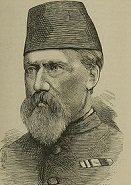
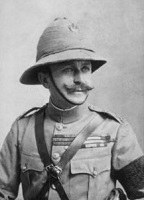

In 1883 a fundamentalist Muslim Arab rebellion begins in the Egyptian province of Sudan, led by Muslim Sufi Samaniyya Sheikh Muhammad Ahmad (1844-85), who proclaims himself El Mahdi, claiming to be chosen by Allah to lead a holy war (jihad) against infidel Brits, Egyptians, and other Sunni Muslims in order to prepare for the Second Ccoming of Christ (Isa), setting up a Mahdist regime with its own caliph (him) and its own modified Sharia (fight for him rather than go to Mecca, add him to their daily prayers, click on hook-up-my-space?) while coincidentally seeking to restore the Arab slave trade in African blacks which the British had just spent a decade eradicating; Sudanese warlord Rabih az-Zubayr ibn Fadl Allah (Fadlallah) (1842-1900) begins conquering the three kingdoms of Chad W of Lake Chad between the Nile and Ubangi River basins (until 1893); meanwhile on Nov. 5 40K spear-carrying El Mahdi followers known as the Ansar (helpers) (Dervishes) surprise an 8K-man Egyptian garrison leaving El Obeid (Al Ubayyid) and massacre them and steal their weapons, then take the town after a 4-mo. siege, then defeat and massacre an 8K-man force led by British Col. William "Pasha" Hicks (1830-83) after leading them on a wild goose chase until they is dying of thirst, allowing the Mahdi's spear-chucking army to capture 10K British Enfield rifles and several cannons, then defeat Austrian-born Maj. Gen. Sir Rudolf Anton Carl von Slatin (1857-1932) (British gov.-gen. of Dara in SW Darfur), and take over Darfur (W Sudan), followed by Jabal Qadir in S Sudan; after a the British cabinet under Gladstonian paralysis refuses to send help, in Dec. it orders the Egyptians to evacuate, sending Gen. Charles George "Chinese" Gordon (1833-85) to facilitate it, but without an army to back him up; meanwhile believing that his D proves that Christianity is weaker than Islam, Slatin converts to Islam under the name Abd al Qadir.

On Sept. 11, 1883 Sir Evelyn Baring (1841-1917) (later 1st Earl of Cromer) becomes British consul gen. of Egypt (until May 6, 1907), appointing British advisors in Egyptian ministries, making sure the fellahs pay the Euros back every penny loaned, and alienating the Egyptians with his great white father chrome-plated evil overbearing autocratic ways, incl. his statement that "Islam as a social system has been a complete failure... The degradation of women in the East is a canker that begins its destructive work early in childhood, and has eaten into the whole system of Islam", and his solution that Muslims "be persuaded or forced into imbibing the true spirit of Western civilization."
On June 3, 1884 the Hewett Treaty (Treaty of Adwa) between Britain, Egypt, and Ethiopia ends the conflict between Egypt and Ethiopia; Ethiopia is given free transit for all goods incl. arms through the port of Massawa, with Britain guaranteeing protection; Egypt returns Bogos to Ethiopia; Ethiopia agrees to assist Egyptian troops in evacuating from Kassala, Amadid, and Senheit; Egypt agrees to allow passage of the new Abuna (spiritual) head of Ethiopia; Egypt and Ethiopia agree to extradition of criminals; Ethiopis agrees to British arbitration of disagreements; too bad, soon after Egypt evacuates Massawa, Italy invades, starting a new conflict between Ethiopia and Italy.

On Jan. 7, 1892 Egyptian khedive (since 1879) Sir Tewfik Pasha (b. 1852) dies in Heluan Palace near Cairo, and on Jan. 8 his eldest son Abbas II Helmy (Hilmi) (Hilmy) (1874-1944) becomes the last khedive of Egypt (until Dec. 19, 1914).


In 1896 Charlton, London-born English archeologist Sir William Matthew Flinders Petrie (1853-1942) discovers the Merneptah Stele in Luxor, Egypt, which contains the earliest known mention of Israel.


In 1898 Syrian-born Muhammad Rashid Rida (1865-1935) and Egyptian-born Muhammad Abduh (1849-1905) found the weekly mag. Al-Manar (Arab. "The Lighthouse") in Cairo, Egypt (until 1935), promoting Islamic Modernism (Modernist Salafism), based on education in Western science and technology while straining against the restrictions of their medieval faith but striving to preserve the unity of the Ummah (Muslim nation).
On June 13, 1906 the Denshawai (Dinshaway) Incident sees five British army officers visiting Denshawai, Egypt to shoot domestic pigeons piss-off villagers, who demonstrate against them, after which they open fire, wounding five and setting fire to their grain, after which the villagers capture but don't harm them; too bad, two officers escape, and one dies of heat stroke trying to get away after which Egyptian gov. (since 1879) Sir Evelyn Baring, Lord Cromer sends the British army in, arresting 52 villagers and railroading four of them to death sentences for murdering the sunstroked whitey, crassly hanging them in front of their families while flogging 80 others with 50 lashes each, then imprisoning an Egyptian policeman for telling the truth; "May Allah compensate us well for this world of meanness, for this world of injustice, for this world of cruelty" (hanged man Darweesh's


On Dec. 18-19, 1914 after he tries to ally Egypt with Turkey and the Central Powers, the British dethrone Egyptian khedive Abbas Hilmi II, and enthrone his Anglophile uncle (associate of Lord Horatio Kitchener) Hussein (Husayn) Kamil (Kamel) (Kemal) (1853-1917) as sultan (until Oct. 9, 1917), then declare Egypt a British protectorate, officially detaching it from the Ottoman Empire; Abbas II goes into exile in Switzerland; Hussein Rushdi (Roshdy) Pasha (1863-1928) becomes PM of Egypt (until 1919).
On Jan. 28, 1915 the Sinai and Palestine Campaign is begun by the British against the Ottoman Empire, starting with an Ottoman attempt on the Suez Canal and ending on Oct. 30, 1917 with the Ottoman cession of Palestine and Syria.
On Nov. 14, 1915 the Senussi Campaign (ends Feb. 1917) sees Muslim Senussi tribesmen from Libya allied with the Turks attack the British-Egyptian border post at Sollum, which is evacuated on Nov. 23; on Nov. 16 300 tribesmen occupy Zura Monastery in Sidi Barrani, using the desert as a hiding place after British troops arrive; fresh troops of the Egyptian Expeditionary Force under Gen. Sir Archibald Murray are sent to help hold Egypt against a possible (imaginary) Turkish invasion; "In some respects this was the most successful strategical move made by our enemies in the whole war, for these odd thousand rather verminous Arabs tied up on the Western Frontier for over a year some 30K troops badly required elsewhere and caused us to expend on desert railways, desert cars, transport etc. sufficient to add 2d to the income tax for the lifetime of the present generation" (Capt. Jarvis) - nothing like good ole jihad?
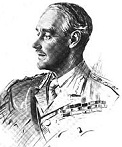
On Mar. 10, 1916 the British Egyptian Expeditionary Force is formed from the British Force in Egypt and the Mediterranean Expeditionary Force under the command of former chief of staff of the British Expeditionary Force (BEF) (1914-15) Gen. Archibald James "Old Archie" Murray (1860-1945) (until June 1917).
On Aug. 3-5, 1916 the Battle of Romani 23 mi. E of the Suez Canal is a V for the British Egyptian Expeditionary Force over the Ottomans and Germans, securing the canal, becoming the first British V over the Ottomans - there was a whole lot of screaming and shaking going on?

On Mar. 26, 1917 the First Battle of Gaza is a D for the British Egyptian Expeditionary Force (EEF) for the 2-1 outnumbered Turks under German Gen. Friedrich Freiherr Kress von Kressenstein; on Apr. 17-19 the Second Battle of Gaza is another D, causing French and Italian reinforcements to be called in, and Gen. Sir Edmund Henry Hynman Allenby (1861-1936), "the Bloody Bull" to replace Gen. Sir Archibald Murray as CIC of British forces in the Middle East (Egyptian Expeditionary Force) on June 29, with instructions to take Jerusalem by Christmas (not Hanukkah?); the 2nd attack sees the Brits use gas on the Palestine Front for the first time, along with eight tanks, which break down in desert conditions, the Turks capturing three of them.
On Sept. 16, 1917 after learning that they would have to work until the end of the war, 500 Egyptian workers mutiny in Marseilles; on Sept. 28 leader Mohamed Ahmed is shot for mutiny.

On Oct. 9, 1917 Egyptian sultan (since Dec. 19, 1914) Hussein Kamil (b. 1853) dies, and his only son Prince Kamal El Din Hussein abdicates the throne for Khedive Ismail's son Ahmad Fuad (Fouad) I (1868-1936), who becomes sultan on Oct. 9 (until Apr. 28, 1936), demoting himself to king on Mar. 15, 1922.
On Oct. 27, 1917 the Battle of El Buqqar Ridge in El Buqqar (Zeelim), S Palestine sees the Yildirim Army Group unsuccessfully attack the 8th Mounted Brigade of the Egyptian Expeditionary Force in an attempt to break the stalemate.
On Oct. 31, 1917 after an elaborate deception plan to lead the Turkish Eighth Army under German Gen. Otto Kress von Kressenstein to believe that they were going to attack Gaza for a 3rd time, 40K British troops under Gen. Allenby win the Battle of Beersheba against the Turks under Gen. Mustafa Ismet Pasa (Inonu) (1884-1973); on Nov. 1 (night) the Third Battle of Gaza breaks through the Gaza-Beersheba line; on Nov. 6 they win the Battle of Tel el Khuweilfeh; on Nov. 6-7 they win the Battle of Hareira and Sheria; on Nov. 7 they finally capture Gaza, helped by Jewish soldiers of the 39th Battalion Royal Fusiliers, capturing 4K Turkish POWs and 59 heavy guns, opening the way to Jerusalem; a minaret in the main mosque that is being used as an artillery observation point is destroyed by gunfire from a naval flotilla; on Nov. 8 British aircraft bomb the German airfield at El-Tine, destroying 11 aircraft and causing hundreds of Turkish troops to flee; on Nov. 8 the Charge (Affair) at Huj sees the British 5th Mounted Brigade capture Huj in S Palestine after losing 26 KIA and 40 wounded out of 170 men, along with 100 horses KIA; on Nov. 11 the British War Cabinet warns Gen. Allenby to slow down, reminding him of Kut in 1915; on Nov. 13 they win the Battle of Mughar Ridge, followed on Nov. 14 the Battle of Ayun Kara, and on Nov. 15 they occupy Ramleh and Lydda (Lydde) (Lod) (home of St. George of dragon fame); on Nov. 16 they occupy Jaffa.
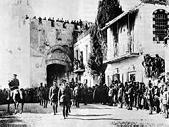
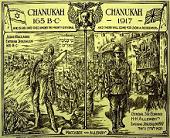
Saladin turns over in his grave? On Nov. 17, 1917 the Battle of Jerusalem (ends Dec. 30) sees the British Army led by Gen. Sir Edmund Henry Hynman Allenby (1861-1936) fight to capture Jerusalem, sieging it on Dec. 8, and capturing it on Dec. 9 after the Turkish defenders slip away overnight to Nablus and Jericho, and British Pvts. Church and Andrews encounter a group of dignitaries (mayor, priests, rabbis, and imams) early in the morning carrying a white flag while out searching for eggs, with Gen. Allenby pissing-off the Muslims by announcing that the Crusades have been completed and triumphally entering the Old City on foot Jesus-style through the Jaffa Gate on Dec. 11, which PM David Lloyd George calls a "Christmas present for the British people"; back in 1191 English king Richard I Lionheart got as close as the egg-loving privates, but never captured Big J; actually Allenby did it to avoid copying the Kaiser's triumphal horseback entry in 1898, and afterwards no Allied flags are flown over the city, and Indian Muslim troops are sent to guard the Dome of the Rock; Allenby's proclamation of goodwill is read aloud in English, French, Hebrew, Arabic, Russian, and Greek; church bells are rung in Rome and London, and Jews worldwide are turned on by hopes of a national you know what; in Jerusalem Allenby obtains a fighting spider he names Hindenburg, which can bite off a scorpion's tail; the name Allenby bears a calligraphic resemblance to the Arabic prophet Al-Neby, causing some to think of him as a Muslim liberator, assuming that he knows that no land once ruled in Allah's name can ever be ruled by infidels, esp. pesky Jews, without Muslims being required to declare jihad? On Nov. 18-24 the Battle of Nebi Samwil (Tomb of Samuel) on the route to Jerusalem sees the British defeat the Ottomans on Nov. 21, only to face repeated counterattacks until Nov. 24.
On Dec. 1, 1917 the Battle of El Burj is another British Egyptian Expeditionary Force V against the Ottoman Yidilirim Army Group on the way to Jerusalem.
Is it the ancient scourage of Islam, or, Why pick Christmas to attack Jerusalem? On Dec. 25, 1917 (Xmas) Mass is celebrated in Jerusalem and Bethlehem to the sound of Turkish artillery fire from the N and E; on Dec. 26 (eve.) German and fresh Turkish troops attack from the N along the Nablus road and from the E along the Jericho road; 50 British troops are surrounded in an ancient monastery by 700 Turkish troops, and hold out until relief arrives on the morning of Dec. 28, when the British army of Gen. Allenby strikes out N from Jerusalem, halting after 10 mi., taking 750 POWs, incl. some German officers captured by Irish trooops, who tell them that they were told that the enemy would all be "Indians and the scum of Egypt."
On Dec. 31, 1917 British troop ship HMTS Osmanieh hits a mine and sinks off Alexandria, Egypt, killing 198, making 1K British naval deaths in one week, and 520 merchant seamen in Dec.
On Mar. 9, 1919 after nationalist Wafd Party leader Said Zaghlul is arrested by the British, the mainly non-violent First (1919) Egyptian Rev., Egypt's first modern nationalist revolt (ends 1922) breaks out in Cairo then spreads, killing 800 in three weeks; on Apr. 7 the British release Zaghlul and his Wafdist leaders, who head for the Paris Peace Conference.
On Oct. 17, 1919 British field marshal (since July 31) Sir Edmund Henry Hynman Allenby, 1st Viscount Allenby (1861-1936) is appointed British high commissioner of Egypt (until 1925), replacing Sir Reginald Wingate.

On Dec. 7, 1919 a British commission led by Lord Alfred Milner (1854-1925) arrives in Egypt to investigate the Mar. Rev., causing a unanimous boycott of the proceedings by Egyptians, styming them; in Mar. 1920 they head back to Britain.
In 1922 after pogroms in Europe and the opening of the Suez Canal attract them, the Jewish pop. of Egypt is 75K-80K; by 2004 it is less than 100.


On Jan. 23, 1922 after two years of talks with Britain, the Egyptian Wafdist (nationalist) leaders proclaim a policy of passive resistance to British rule; on Feb. 28 Britain relents and grants Egypt its independence, but retains authority over its foreign policy and defense, the Suez Canal and the Sudan, along with the Capitulations (special courts for foreigners), ending the 1919 Egyptian Rev.; on Mar. 15 sultan (since Oct. 9, 1917) Fuad (Fouad) I (1868-1936) is demoted from sultan to king of Egypt (until Apr. 28, 1936); since it is a unilateral declaration with four hated reservations, the Egyptians accept it grumblingly while waiting for their chance, the pot bubbling ever harder until the 1952 rev., while 32 different govts. are formed, with a stable pool of cabinet members dominated by the landholding class and the Wafdist Party; the only opposition party at first is the Liberal Constitutional Party, led by Adli Yakan (Yegen) Pasha (1864-1933), based on the writings of Ahmad Lutfi al-Sayyid (1872-1963) and Muhammad Husayn Haykal (1888-1956); an Egyptian Communist Party is formed, but it never attracts much support; the success of the nonviolent Egyptian rev. inspires Gandhi - where did all the good times go?



On Nov. 4, 1922 Kensington, London-born English Egyptologist Howard Carter (1874-1939) announces his discovery, along with financial backer George Edward Stanhope Molyneux Herbert, 5th Earl Carnarvon (1866-1923) of KV62, the Valley of the Kings tomb of 18-y.-o. king Tut (Tutankhamun) (d. -1323) underneath workmen's huts from the Ramesside Period, becoming the first Egyptian tomb discovered unopened in modern times, containing more than 5K objects, incl. his lifelike Gold Death Mask of King Tutankhamun on his mummy, found inside nine outer cases and a 300-lb. gold inner case; on Nov. 26 Carter makes a "tiny breach in the top left hand corner", allowing them to peer by candlelight at the "wonderful things" of glimmering gold and ebony.

Hey there, it's me, up on the roof of your car? In Mar. 1928 the Sunni Muslim Brotherhood (al-Ikhwan a-Muslimun) is founded in Ismailia, Egypt by six Suez Canal Co. workers led by schoolteacher Hassan al-Banna (1906-49), launching the Islamic radicalism movement that becomes so much fun by 9/11; al-Banna also founds Islamic banking as a way to subvert the Western banking system; the HQ is moved to Cairo in 1932, becoming openly anti-British and anti-Zionist, then going violent by the 1940s.
On May 7, 1929 the Nile Waters Agreement between Egypt and Sudan allocates all White Nile water to Egypt, and Blue Nile water to Sudan, settling the 1926 dispute.

On Aug. 8, 1929 Sir Percy Lyham Loraine, 12th Baronet (1880-1961) becomes British high commissioner in Egypt (until 1933), followed by British ambassador to Turkey in 1933-9, and British ambassador to Italy in 1939-40.

On Jan. 1, 1930 Wafdist Party leader Mustafa al-Nahhas becomes PM of Egypt until June 21, when the king replaces him by Ismail Sidqi (1875-1950) (until 1933) to circumvent the parliament, causing Wafdist protests around the country.
In Feb. 1930 the Egyptian govt. sets high duties on imports to encourage native industry.
On Oct. 22, 1930 Egypt imposes a new 1930 Egyptian Constitution, weakening the Wafdist Party's control over the parliament, causing protests.
In May 1931 the People's Party, formed by King Fouad I's puppet PM Isma'il Sidqi wins rigged parliamentary elections in Egypt, pissing-off the Wafdist Party even more.

On Apr. 28, 1936 king (since Mar. 15, 1922) Fouad (Fuad) I (b. 1868) dies, and his 15-y.-o. son Farouk (Faruq) I (1920-65) becomes king #10 of Egypt and Sudan (until July 26, 1952), under a regency council until July 1937, going on to back the Muslim religious establishment against secularist politicians and scheme to end the constitutional system and become an autocrat while enjoying popularity; on May 2 nat. elections give a big V to the Wafdist Party, and Mustafa al-Nahas becomes PM again (until 1937), beginning negotiations with Britain to end its influence.
On June 22, 1940 the Italians bomb Alexandria, Egypt.
On July 7, 1940 to avoid another Mers-el-Kebir the French Vichy navy in Alexandria, Egypt folds and scuttles their ships; meanwhile those at Casablanca and Dakar refuse, causing the British to damage battleships Richelieu and Jean Bart.
On Aug. 30, 1940 the British begin Operation Hats, sending several warships from Gibraltar to Alexandria carrying munitions to build British strength in Egypt.
On Sept. 11, 1940 Italy invades Egypt to gain control of the Suez Canal.
On Sept. 13, 1940 the Italians cross their Libyan border and occupy Sollum, Egypt, threatening the British naval base at Alexandria and the Suez Canal.
On Nov. 7, 1940 Operation Coat sees five British warships led by battleship Barham leave Gibraltar to reinforce naval forces in Egypt.
On Mar. 5, 1941 Operation Lustre begins, ferrying 60,364 British troops (four divs.) to Greece from Egypt. On Apr. 14 Gen. Rommel captures Sollum, Egypt, along with Halfaya Pass. On Apr. 19 (night) attempting to relieve Tobruk, a British commando force lands at Bardia, but is driven off; on Apr. 21 after learning that Gen. Rommel is about to be reinforced with a tank div. at Tobruk, Churchill launches Operation Tiger, sending tanks from Britain to Egypt, hoping there will be no German invasion of Britain. On May 6 Operation Tiger II sees 13 British merchant ships leave Gibraltar, arriving in Egypt after losing one ship, bringing 238 tanks and 43 fighters. On May 15 after decoding German messages revealing that Gen. Rommel's forces are tired and need rest, the British attack at the Egyptian border in Operation Brevity, forcing them to withdraw from the Halfaya Pass; on May 27 Gen. Rommel recaptures Halfaya Pass, taking 3K POWs and 123 big guns; on May 29 Rommel counterattacks, but they decode the messages again and withdraw in time. On June 14 75 merchant ships incl. 30 flying the U.S. flag set sail for Egypt carrying military supplies incl. 200 U.S. tanks. On Aug. 21 Australian troops in besieged Tobruk sail back to Egypt after losing 832 KIA and 7K taken POW, and are replaced by British troops. On Sept. 6 U.S. merchant ship SS Steel Seafarer en route to Egypt is sunk by German aircraft in the Red Sea 200 mi. S of Suez.

On Nov. 25, 1941 German sub U-331 under Lt. Hans-Dietrich Freiherr von Tiesenhausen (1913-2001) sinks British battleship HMS Barham off Sollum, Egypt, killing 841 of 1,184.
In Dec. 1941-Jan. 1942 the British take Cyrenaica, Egypt.
On Feb. 4, 1942 Egyptian King Farouk I has a humiliating confrontation with British ambassador Sir Miles Wedderburn Lampson (1880-1964), surrounding his Abdin Palace with tanks and issuing an ultimatum, taking the poop out of his plans to become an autocrat by forcing him to reinstate the nationalist Wafdist Party as a counter to Axis sympathizers; Ahmed Maher El-Sayid becomes PM (until 1945); Lampson is created Baron Killearn next year after earning it through his big killing with the Egyptians; Egypt remains officially neutral throughout the war until Feb. 1945 but cooperates with the British; the Wafd govt. of Egypt passes a Trade Union Act (Law 85) permitting unions except in agriculture while giving the state extensive powers to regulate them.
On June 11, 1942 German Gen. Rommel's forces capture French-held Bir Hakeim, and head towards the Egyptian border.

On June 20, 1942 (5:30 a.m.) Gen. Rommel begins his assault on Tobruk, Libya; at 7:00 p.m. the first German Panzers enter; on June 21 (8:00 a.m.) South African Gen. Hendrik Balzazar Klopper (1903-77) surrenders his 30K men, along with 20K vehicles, 2K tons of gasoline, and 5K tons of rations; Churchill tells FDR "Defeat is one thing, disgrace is another", causing FDR to reply "What can we do to help?"; Hitler immediately awards Rommel a field marshal's baton, causing Rommel to reply "I'm going to Disneyland", er, "I'm going to Suez", telling his wife "I would rather he had given me one more division"; on June 22 the British fall back to Mersa Matruh, Egypt 180 mi. from Alexandria.
On June 30, 1942 after launching Operation Aida, Gen. Erwin Rommel pushes the British back to El Alamein ("the two flags") 60 mi. W of Alexandria, taking 6K POWs, causing Mussolini to fly to Cyrenaica to prepare a triumphal entry into Cairo, while the U.S. and Britain frantically divert military resources to Egypt, and Jews in Palestine prepare to defend Haifa; on July 1-27 the First Battle of Alamein sees Rommel, reduced to 55 tanks stopped by the Allies' strongly fortified line, causing Mussolini to give up and return to Italy. On Aug. 30-Sept. 5 after writing "The decision to attack today is the most serious I have taken in my life. Either the army in Russia succeeds in getting through to Grozny, and we in Africa manage to reach the Suez Canal, or..." a last-chance German thrust toward the Nile Delta by Gen. Rommel is driven back by Gen. Montgomery in the Battle of Alam el Halfa on the Alam el Halfa ridge in front of El Alamein, with heavy German tank losses, becoming Montgomery's first desert V; Kiwi troops first encounter German butterfly "breadbasket" anti-personnel bombs; on Sept. 3 Rommel begins his retreat from Egypt, and from now on is on the loser's team. On Oct. 23 (8 p.m.) 150K British forces under Gen. Montgomery launch Operation Supercharge, beginning the Second Battle of El Alamein in Egypt (ends Nov. 1), attacking the Germans and Italians starting with a barrage by 1K of 2,182 artillery; Montgomery's 1K tanks, 500 fighters, and 200 bombers incl. U.S. Sherman tanks defeat the 480 German Panzers, which are suffering fuel shortages, plus Gen. Rommel is on sick leave in Germany; too bad, on Oct. 24 Rommel's replacement Gen. Georg Stumme (1886-1942) dies of a heart attack near El Alamein during an attack on his car while reviewing front troops, and Rommel returns on Oct. 25; on Oct. 27 the British score a V, with 2.3K Germans and Italians KIA and 27,900 taken POW. On Nov. 4 after getting Hitler to reverse his Nov. 3 orders to fight to the last man, Gen. Rommel begins a retreat from El Alamein, becoming Germany's first D by the Western Allies as its grip on North Africa, the Suez Canal, and the Middle East begins to loosen; Rommel is driven back to the Libyan border, defending Sidi Barrani, Egypt 200 mi. W of El Alamein on Nov. 9, causing Sir Winston Churchill on Nov. 10 to utter the soundbyte: "Now this is not the end. It is not even the beginning of the end. But it is, perhaps, the end of the beginning. Henceforth Hitler's Nazis will meet equally well armed, and perhaps better armed troops. Henceforth they will have to face in many theatres of war that superiority in the air which they have so often used without mercy against other, of which they boasted all round the world, and which they intended to use as an instrument for convincing all other peoples that all resistance to them was hopeless." On Nov. 13 British forces retake Tobruk, pushing the Germans and Italians back to Gazala on Nov. 14; on Nov. 15 church bells are rung throughout England to celebrate the V in Egypt.
On Dec. 4-6, 1943 the Second Cairo Conference in Egypt is attended by FDR and Winston Churchill, along with Turkish pres. Ismet Inonu, who is told that staying neutral will block the Axis from reaching the Middle East strategic oil reserves.
In 1943 Egypt finally repays its mid-19th cent. foreign debt.
On Oct. 7, 1944 the Alexandria Protocol is signed, committing Egypt to join the new Arab League.
On Feb. 24, 1945 Egypt declares war on Germany and Japan; Egyptian PM Ahmed Maher (b. 1888) is assassinated in parliament after reading a decree.
On Mar. 22, 1945 the Arab League is chartered in Cairo, Egypt, with members incl. Egypt, Iraq, Jordan, Lebanon, Saudi Arabia, and Syria; Yemen joins on May 5; by 2018 it has 22 members, with Syria suspended in Nov. 2011.
Now that the corpses are about buried, the Devil leaves the world a little Valentine's Day present on Christmas? In Dec. 1945 52 Gnostic texts on 13 papyrus codices (enough to form a "Gnostic New Testament"), incl. 40 previously unknown, dating back to the 2nd cent. C.E., some perhaps by Roman Gnostic Valentinus (100-155) are discovered near the village of Nag Hammadi in the Jabal al-Tarif Mts. of Upper Egypt near the Nile River N of Luxor, although some of the papyrus books bound in tooled gazelle leather are used as stove stuffers before finding their way to the Coptic Museum in Cairo; they are not pub. until 1956-77, giving fodder to conspiracy theorists about containing some mysterious disproof of Christianity; Codex I, AKA the Jung Codex is smuggled out of Egypt and ends up in the possession of Gnosticism nut Carl Jung (later returned); texts incl.: Gospel of Thomas ("These are the secret words which the living Jesus spoke, and which the twin Judas Thomas wrote down"), Gospel of Philip (describes Jesus' kissing relationship with Mary Magdalene), Gospel of Mary Magdalene (describes her as a disciple and leader), Apocalypse of Peter, Gospel of Peter, Acts of Peter and the Twelve Apostles, Letter of Peter to Philip, First Apocalypse of James, Second Apocalypse of James, Apocalypse of Paul, Gospel of Truth (Buddhist undertones?), Treatise on the Resurrection, Apocryphon (Secret Book) of John, Hypostasis of the Archons, Gospel of the Egyptians, Apocalypse of Adam, Three Steles of Seth, and Second Treatise of the Great Seth.

In 1945 Immanuel Velikovsky (1895-1979) pub. Theses for the Reconstruction of Ancient History; the first pamphlet by a learned Vietebsk, Russia-born Jewish Zionist scholar describing his radical attempt to reconcile the Bible with the secular history of Egypt by sliding the latter by 600 years, claiming that the Ipuwer Papyrus describes the Exodus, and that it is in reality a great natural catastrophe caused by a collision between Earth and other planets, raising the profound issue of how Science can cope with unique catastrophes; too bad, he goes off the deep end with elaborate theories of planets causing all Biblical miracles, stinking himself up? On Apr. 3, 1950 he pub. the NYT bestseller Worlds in Collision, making Albert Einstein a fan; how a comet-like object was ejected from Jupiter in the 15th cent. B.C.E., changing the Earth's orbit and axis and causing catastrophes that are described in the Bible, then settled down as the new planet Venus, after which in the 8th-7th cents. B.C.E., Mars acted up, causing more catastrophes, after which everything settled down and here we are let me tell you all about it?; an imaginative erudite pseudo-scientific Bible-thumping alternative to standard science that pisses-off the scientific establishment (Harlow Shapley, Carl Sagan et al.) so much that they begin a boycott of Macmillan's textbooks, causing them to drop it in 2 mo. despite being a bestseller, after which Doubleday says ka-ching ka-ching thanks.
On Feb. 21, 1946 anti-British demonstrations take place in Egypt, followed by anti-British demonstrations in India on Feb. 23.
On May 4, 1947 the first of 82K German POWs are repatriated from Egypt; "Those who are still enthusiastic Nazis and Fascists, numbering 5,000, will be the last to be removed." (Palestine Post)
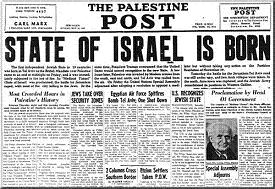








A big day for Bible thumpers and Millennium Feverists? "Thus says the Lord God: O my people, I will open your graves and have you rise from them, and bring you back to the land of Israel." (Ezekiel 37:12) On May 14, 1948 (midnight) the Jewish Nat. Council in Tel Aviv, Palestine proclaims the new Jewish State of Israel, with David Ben-Gurion (1886-1973) (known for the soundbyte "The Bible is our deed to the land of Israel") as PM #1 (until Jan. 24, 1954); it incl. an Unwritten Israeli Constitution, and a unicameral Knesset (Heb. "assembly"), whose HQ along with the Israeli Supreme Court bldg. are paid for by Yad Hanadiv (Rothschild Foundation), chaired by wealthy English Zionist Dorothy Mathilde de Rothschild (nee Pinto) (1895-1988); "We offer peace and amity to all the neighboring states and their peoples, and invite them to cooperate with the independent Jewish nation for the common good of all. The State of Israel is ready to contribute its full share to the peaceful progress and development of the Middle East"; the U.S. recognizes it 11 min. later, but Pres. Truman refuses to call it a Jewish state, although he ignores advice from his advisers in order to recognize it because he believed that it fulfills Biblical prophecy?; "Thus says the Lord God: O my people, I will open your graves and have you rise from them, and bring you back to the land of Israel." (Ezekiel 37:12); the Israeli army had nine obsolete planes for an air force, no cannons or tanks, and 60K trained fighters, only 18.9K of them fully ready for fighting, causing operations chief Yigael Yadin to tell David Ben-Gurion, "The best we can tell you is that we have a 50-50 chance." On May 15 the British Palestine Mandate ends and the British withdraw, leading to the 1948 Arab-Israeli War with Arab states as Lebanese, Syrian, Iraqi, Egyptian, and Transjordanian troops, supported by Saudi and Yemenite troops attack, screaming "Allahu Akbar", "Jihad", and "Idbah al-Yahud" (slaughter the Jews), showing that it isn't a nationalist but a religious struggle, and sorry, but Islam will never accept the Jewish state of Israel; the Islamic Resistance in Lebanon is founded to wage jihad, later becoming Hezbollah; on May 15 Egyptian Arab League secy.-gen. #1 (1945-52) Abdul Rahman Hassan Azzam Pasha (1893-1976) utters the soundbyte "This will be a war of extermination and a momentous massacre"; on May 17 the Soviet Union recognizes Israel; Jordanian King Abdullah Ibn Hussein's British-trained Arab League under British Lt. Gen. Sir John Bagot Glubb (1897-1986) (AKA Glubb Pasha) seizes control of Judea and Samaria, along with the Jewish Quarter in the Old City of Jerusalem on May 28 ("The blackest event in Israel's War of Independence") and annexes them, cutting off access by Jews to the Western Wall until 1967, going on to destroy or desecrate 50+ synagogues in the Jewish Quarter; only Great Britain and Pakistan recognize the annexation; Egypt occupies (but doesn't annex) Gaza; U.S. aircraft manufacturer Adolf "Al" Schwimmer (1917-2011) violates U.S. laws to smuggle surplus aircraft and found the Israeli Air Force on May 28, is convicted in 1950 of violating the U.S. Neutrality Act, and becomes pres. of Israel Aircraft Industries until 1978, finally receiving a pardon by Pres. Bill Clinton in 2000; onu May 29 the U.N. Truce Supervision Org. (UNTSO) (the first U.N. peacekeeping force) is established, with HQ in Jerusalem to oversee the truce; Golda Meir (1898-1978) becomes the Israeli ambassador to the U.N; Ha Tikva(h) becomes the Israeli nat. anthem; the knee-jerk reaction of Arabs is to expel all Jews from Arab cities from Casablanca to Baghdad; the Christian pop. of Jordanian Jerusalem falls from 25K to 11K by 1967 as restrictive laws are placed on them; the Vatican hides the Temple Menorah and other holy vessels looted from the Jewish Temple of Jerusalem in 70 CE so that they can't be used by the Israelis to rebuild it; they are returned on ? On Oct. 1 Jerusalem mufti Amin al-Husayni declares the All-Palestine Govt. before the Palestine Nat. Council in Gaza; too bad, Gaza is run by Egypt, which lets the new state die on the vine. On Dec. 11 by 35-23 the non-binding U.N. Gen. Assembly Resolution 194 is passed, calling for the return of Palestinian refugees to their homes; all six Arab countries at the U.N. (Egypt, Iraq, Lebanon, Saudi Arabia, Syria, and Yemen) vote against it; Israel isn't a U.N. member yet.
On Jan. 7, 1949 Israeli planes shoot down four British RAF planes over the Israeli-Egypt border. On Jan. 31 the U.S. grants de jure recognition to the state of Israel; on Feb. 17 Chaim Weizmann (1874-1952) becomes pres. #1 of of Israel (until 1952); armistice agreements are signed with Israel by Egypt (Feb. 24), Lebanon (Mar. 23), Jordan (Apr. 3), and Syria (July 20); Iraq withdraws troops but refuses to sign. On Mar. 4 the U.N. Security Council votes 9-1-1 (Egypt against, U.K. abstaining) for Resolution 69 authorizing the admission of Israel; on May 11 U.N. Gen. Assembly Resolution 273 is passed by 37-12-9, admitting the state of Israel to the U.N. as member #59, with the soundbyte that it "decides that Israel is a peace loving State which accepts the obligations contained in the Charter and is able and willing to carry out those obligations", raising the Israeli flag on the U.N. bldg.

On Jan. 26, 1952 Egypt is placed under martial law after mobs destroy U.S. and British property in Cairo. July 26 is Nasser-Peron-Stevenson day at the zoo? On July 23 after he invites Anwar el-Sadat to come to Cairo from Sinai on the evening of July 22, and he nearly misses the overthrow because he took his family to a movie, the Free Officers Movement of Egyptian military officers led by Gen. Gamal ("camel") Abdel Nasser Hussein (1918-70) (known for doing his plotting at the Cafe Riche in Cairo) launches the July 23, 1952 Egyptian Rev., and on July 26 King Farouk I is forced to abdicate in favor of his infant son Ahmed Fouad II (1952-) (until June 18, 1953), then go into exile in Italy, taking his priceless porno collection with him, and leaving behind a vast Am. comic book collection, another vast stamp collection, 50 walking sticks, a pocket radiation counter, 75 pairs of binoculars, 1K ties, photos depicting copulating elephants, and a $20 U.S. double eagle that had been stolen from the Philadelphia Mint museum; the radical fundamentalist Muslim Brotherhood at first backs Nasser, but when he refuses to impose Sharia or even ban alcohol, they turn on him; Nasser publicly calls the Palestinian issue unimportant, but privately pushes an anti-Zionist agenda to increase his power in the Arab world; the military rules Egypt until ?; next military coup in 2011.
On July 2, 1954 the Lavon Affair AKA Operation Susannah, led by Israel Col. Binyamin Gibli uses Egyptian Jews to engage in false flag operations by bombing U.S. and British civilian targets in Egypt and blaming them on Egyptian Communists and the Muslim Brotherhood in order to keep the British occupation of the Suez Canal zone going, starting with a post office in Alexandria, followed on July 14 by the U.S. Info. Agency libraries in Alexandria and Cairo, and a British-owned theater; on Dec. 11 several arrested suspects are tried, with Israel denying knowledge and accusing Egypt of anti-Semitism to discredit them; on Jan. 27 Moshe Marzouk and Shmuel Azar are sentenced to death, several receive lengthy prison terms, and two are acquitted; after he is caught lying to PM Moshe Sharett, Israeli defense minister Pinhas Levon resigns on Feb. 17, 1955, and is succeeded by former PM David Ben-Gurion on Feb. 21 (until June 26, 1963), and Sharett resigns on Nov. 3, 1955, after which it becomes known as the Bad Business or Unfortunate Affair; on Mar. 30, 2005 Israel honors nine of the operatives.
On June 23, 1956 Lt. Col. Gamal Abdel Nasser is elected pres. #2 of Egypt (until Sept. 28, 1970), backed by a military junta, just as Britain, under U.S. pressure (Ike threatens heavily-indebted England with a run on the pound?) withdraws the last of its troops from Suez.
On July 19, 1956 the Suez Crisis (ends Nov. 7) begins after ungrateful pres. Gamal Abdel Nasser trades $200M in Egyptian cotton for guns from Czech., causing U.S. secy. of state John Foster Dulles to cancel the U.S. Aswan High Dam loan, causing Nasser on July 20 to nationalize the Suez Canal (which carries 1.5M barrels of oil a day, 1.2M going to W Europe), saying "I look at Americans and say, may you choke to death on your fury!", followed by "We shall build the high dam as we desire. The annual income of the Suez Canal is $100M. Why not take it ourselves?"; in Sept. Egypt takes control of the canal, expelling foreign technicians; at this point the Israelis are pissed-off by Egyptian-backed guerrilla raids from the Gaza Strip, the Brits by the nationalization of the Suez Canal, and the French by Egyptian support of Algerian independence, forming a conspiracy to overthrow Nasser, with British PM Sir Anthony Eden (who sees him as a new Mussolini) hiring CIA man (close friend of Nasser) Miles Axe Copeland Jr. (1916-91) to assassinate him, while planning begins for Operation Musketeer, a French-British plan to recapture the Suez Canal; too bad, Ike opposes the invasion on the grounds that he is an advocate of decolonization, showing Eden and the British up as wusses when they are forced to back down because of their financial dependence on the U.S.; the net result is that Israel moves closer to the U.S. govt., which becomes dominant in the region, and never undertakes any significant military operation without obtaining U.S. consent in advance (until ?); in Sept. French PM Guy Mollete secretly requests to merge France with the U.K. and join the Commonwealth of Nations, but British PM Anthony Eden turns him down, after which in Oct. he meets with Israeli PM David Ben-Gurion and agrees to stage a joint attack on Egypt.
In 1956 Egyptian pres. Gamal Abdel Nasser abolishes Christian Coptic courts.
In spring 1957 a revolt by pro-Egyptian army officers causes King Hussein to declare martial law in Jordan, and Ike invokes the Truman Doctrine to send economic aid to Jordan while sending U.S. naval forces into the E Mediterranean to help him; Israeli forces pull out of the Sinai Peninsula and hand over the Gaza Strip to U.N. forces; Dag Hammarskjold visits Nasser and gets the Suez Canal reopened to naviation, after which the U.S. resumes aid to Israel.
On Feb. 1, 1958 Egypt and Syria form a loose pan-Arab affiliation under the name United Arab Repub. (ends 1971), with Gamal Abdal Nasser as pres. #1; on Mar. 8 North Yemen joins, creating the United Arab States.

On Sept. 28, 1961 a military coup begins in Damascus, Syria; on Sept. 29 the United Arab Repub. (UAR) of Egypt and Syria breaks up, and Syria becomes independent; on Dec. 14 Nazim al-Kudsi (al-Qudsi) (1906-98) becomes pres. of Syria (until Mar. 7, 1963), going on to restore relations with anti-Nasser regimes in Jordan, Lebanon, and Saudi Arabia, along with the U.S. and U.K., and denationalize factories, causing the World Bank to make loans to Syria.

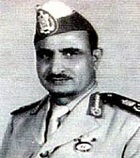
On Sept. 18, 1962 Yemeni king (since 1948) Ahmad bin Yahya (b. 1891) dies, and his son imam Mohammed al-Badr (1926-96) succeeds him, but on Sept. 27 an army coup overthrows him and his tyrannical medieval Shiite Zaidi Hamiduddin Dynasty of the Mutawakkilite Kingdom of Yemen, and proclaims the Yemen Arab Repub. (YAR) under the leadership of Col. Abdullah al-Salal (1919-94), while the deposed imam flees to Saudi Arabia, where he tries to fight his way back in with support from them, Britain and Jordan, while the UAR supports the repub. govt. with the aim of union, beginning the Egyptian-Yemeni War (ends 1967), which ends up becoming the Egyptian Vietnam, with Egypt having to commit 55K troops, losing 10K of them; the Shiite Zaydi caliphate founded in 893 ends (until ?), with half the pop. of Yemen (mainly in the N) being Zaydi and waiting in the wings.
On Nov. 5, 1962 after several Saudi princes defect, Saudia Arabia breaks off diplomatic relations with Egypt; on Nov. 6 under pressure from the Kennedy admin., Saudi Arabia abolishes slavery, replacing 400K slaves with 8M guest workers by the end of the cent.

On Dec. 10, 1962 David Lean's Lawrence of Arabia (Columbia Pictures) (Horizon Pictures) debuts, making a star of Irish-born actor Peter Seamus Lorcan O'Toole (1932-) in his first major film as British soldier T.E. Lawrence going Arab during WWI, along with supporting actors Alec Guinness, Anthony Quinn, and Egyptian actor Omar Sharif (Arab. "noble") (Michel Demitri Chalhoub) (1932-2015) (first English language role), culminating in the capture of Damascus after Turkish pasha Jose Ferrer admires O'Toole's peter, er, tool, er, lovely white skin; written by Robert Bolt (1924-95), and Michael Wilson, who is on the Hollywood blacklist and doesn't get his screen credit restored until 1995; the 216-min. flick has no credited speaking roles for women; King Hussein I of Jordan offers David Lean camel-riders of his desert patrol as extras; NYT film critic Bosley Crowther (a big opponent of the Hollywood Blacklist) pans the movie, calling it a "thundering camel-opera that tends to run down rather badly as it rolls on into its third hour and gets involved with sullen disillusion and political deceit"; does $70M box office on a $15M budget.
In 1962 the Federation of Student Islamic Societies is founded in Britain to promote the Egyptian Muslim Brotherhood and founder Hasan al-Banna.



On Feb. 8-9, 1963 with CIA backing, the Baath (Ba'ath) Socialist Party in Iraq overthrows Soviet-leaning Gen. Abdul Karim Kassim in Baghdad and seizes power, putting Kassim through a farcical hours-long trial and then immediately machine gunning him to death in an Iraqi TV studio then holding his lifeless face up to the camera for everybody to see, after which thousands of Communists, trade unionists, and leftist sympathizers are executed; a new 1963 Iraqi Flag is approved, with red-white-black horizontal stripes and three green stars in the white strip to symbolize the union of Iraq with Egypt and Syria as the United Arab Repub.; law student Saddam Hussein (1937-2006) (on the CIA's payroll?) returns from exile in Cairo, Egypt, and resumes his studies in Baghdad, while Ahmed (Ahmed) Hassan al-Bakr (1914-82) becomes PM; on Nov. 18 they are overthrown by the army, led by Pres. Abdel (Abdul) Salam (Abd al-Salam) Mohammed Arif Aljumaily (1921-66), who curtails the Ba'th Party but runs the govt. as a family affair, with no constitution or parliament; Saddam Hussein is imprisoned.
On Mar. 8, 1963 the U.S. warns Egyptian pres. Nasser that its increased bombing of cities in Saudi Arabia is jeopardizing its relations, causing him to back down.
On Mar. 11, 1963 the Iraqi Rev. Council proposes the formation of a joint military command incl. Iraq, Syria, Egypt, Yemen, and Algeria.; the UAR, Syria, and Iraq agree on Apr. 9.

On June 12, 1963 Joseph L. Mankiewicz's Cleopatra debuts, becoming an extravagant $44M, 2-year semi-flop (break-even) (most expensive film to date), based on "The Life and Times of Cleopatra" by C.M. Franzero, not Shakespeare (can't be proven in court); foul-mouthed glam babe Elizabeth Taylor becomes the first female actor to earn $1M for a film; Rex Harrison (first choice: Peter Finch) is the only decent lead actor, attempting to portray Julius Caesar, but coming off as Prof. Henry Higgins in armor?; Harrison's chicken legs are covered with togas and robes; Martin Landau plays Caesar's and Anthony's friend Rufio; Roddy McDowall plays Octavian; Carroll O'Connor plays Casca, the first to stab Caesar in the back; chicken-legged unathletic Richard Burton (who replaces athletic Stephen Boyd when production moves to Italy) bombs as he-man Mark Antony, but starts a torrid public affair with Liz, who dumps Eddie Fisher for him, marrying him nine days after the divorce with Fisher is final in 1964; Cesare Danova plays Cleopatra's head slave Apollodorus; Hume Cronyn plays Cleopatra's minister Sosigenes; six hours of film are created for two separate 3-hour movies (a Caesar movie and an Antony movie), but after 20th Cent. Fox nearly goes bankrupt, new studio head Darryl Zanuck orders it cut down for theaters to four hours, cutting most of the Harrison footage in favor of the celeb love affair of Liz and Burton, pissing-off Mankiewicz for life; during filming Taylor becomes seriously ill and needs an emergency tracheotomy, then two weeks later shows up at the Academy Awards sporting a pair of crutches and a visible scar on her throat; production begins in London but moves to Italy when the $5M mark is reached; the scenes in Rome are delayed for weeks because of heavy rains; several Euro heads of state visit the set; no amount of advertising saves it, but it later makes money with TV rights and home versions; does $26M box office on a $44M budget, becoming the first highest-grossing film of the year to run at a loss (until ?); it later makes $57.7M total; "This picture was conceived in a state of emergency, shot in confusion, and wound up in blind panic" (Joseph L. Mankiewicz); "The toughest three pictures I ever made" (ditto); "I only came to see the asp" (Charles Addams).
In June 1963 Egypt begins using chemical warfare agents against royalist troops in North Yemen, becoming the first state in the Middle East to do so.
In 1963 the Mit Ghamr Savings Bank is founded in Egypt by the Muslim Brotherhood and economist Ahmad Elnaggar (El Najjar), implementing Sharia banking; in 1968 the Egyptian govt. shuts it down after Muslim Brotherhood-led demonstrations.
On Jan. 17, 1964 the PLO Covenant is created in Egypt, declaring "the [1917] Balfour Declaration, the Mandate system and all that has been based upon them ... a fraud", and proclaiming Zionism "an illegal movement", with 29 articles calling for reclamation of Palestine as part of a collective Pan-Arab homeland.
On Mar. 25, 1964 Egypt finally ends its state of siege begun in 1952.
On May 9, 1964 Nikita Khrushchev visits Egypt, and on May 14 he joins Egyptian pres. Gamal Abdel Nasser in setting off charges that begin diverting the Nile River from the site of the Aswan High Dam project; when the dam begins operation, it stops the pesky annual flooding, but it also keeps silt from making it to the Nile Delta region, resulting in the salty sea slowly reclaiming usable land - why fix something that isn't broke?
On Mar. 15, 1964 Egyptian pres. (since June 23, 1956) Gamal Abdel Nasser is reelected (until Sept. 28, 1970).
On Feb. 10, 1965 a truck carrying 66 plunges into a canal outside Al-Ayyat, Egypt, killing 36.
On Mar. 15, 1965 Egyptian pres. (since June 23, 1956) Gamal Abdel Nasser is reelected (until Sept. 28, 1970).
On Nov. 1, 1965 a trackless trolley outside Dokki, Egypt plunges into the Nile River, killing 74.


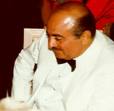
In 1965 popular liberal Egyptian Akhbar-el-Yom (Today's News) journalist and Nasser opponent Mustafa Amin (1914-97) (who got into a telephone argument with Nasser in 1961 after giving more space to Marilyn Monroe's suicide than Nasser's latest speech) is arrested in Alexandria during a meeting with a U.S. diplomat, tortured in jail, railroaded in a kangaroo court on charges of spying for the U.S., and sentenced to life in priz; pres. Anwar Sadat frees him in 1974; meanwhile Chicago mob boss Sam Giancana (1908-75) gets indefinitely jailed by Cook County atty. Edward "Ed" Hanrahan for contempt of court by granting him immunity and forcing him to testify against the mob or rot in jail; lucky for him, Soviet-friendly Egyptian pres. Gamal Abdel Nasser begins going after Israel as well as U.S. business and organized crime in Egypt, causing LBJ to get Saudi-Turkish arms merchant Adnan Khashoggi (Kashoggi) (1935-2017) (who supplied weapons for a cover mission in Yemen during the 1963 Aden Emergency, and has close contacts with the CIA and with Richard Nixon's friend Bebe Rebozo, and who later is implicated in the Iran-Contra Affair) to supply arms to Israel, with Giancana paying him millions in return for getting out of jail, getting set free on May 31, 1966, one year before the Six-Day War - therefore the Six-Day War was funded by organized crime?

On Apr. 15, 1966 Egyptian pres. Gamal Abdel Nasser announces that a conspiracy against him by Islamic fundamentalist Muslim Brotherhood leader Sayyid Qutb (1906-) has been exposed based on his 1964 book Milestones (Ma'alim fi-l-Tariq), which calls for a rev. in Islamic countries to restore Sharia; on Aug. 29 he and two companions are executed; his writings, filled with anti-U.S. jihadist rhetoric later help spawn al-Qaida.
On Aug. 21, 1966 seven men are sentenced to death in Egypt for anti-Nasser agitation.

On Oct. 3, 1966 Tunisia severs diplomatic relations with the UAR (Egypt); meanwhile pro-Western pres. #1 (since July 25, 1957) Habib Bourguiba (1903-2000), the Kemal Ataturk of North Africa, who has already raised the min. marriage age for women from 16 to 17 and for men from 18 to 20, and outlawed polygamy, legalizes abortion and establishes family planning clinics, influencing religious leaders to reinterpret the Quran to make it okay; by the end of the cent. the birthrate plunges from 7.2 to 2.1 per thousand, and its economy outstrips its Egyptian, er, overpopulated neighbors.



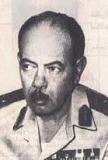


The best defense is a good offense? Israel looks the abyss in the patched eye and saves itself, but for how long nobody knows, while its backer the U.S. flirts with a mini-Armageddon on 6-6-67?
On June 1, 1967 kibbutz-born eye-patched Gen. Moshe Dayan (1915-81)
(known for the soundbyte "Israel has no foreign policy, only a defense policy") is named defense minister of Israel, uniting Israelis around his charisma and gaining
acceptance of a first strike on Egypt; on June 5 (Mon.) (7:50 a.m.) (6-5-6-7) the Six-Day War
breaks out as the Israeli Air Force, led by RAF veteran Ezer Weizman (1924-2005)
sneak-attacks and destroys the Egyptian Air Force in 3 hours, destroying 280 aircraft, then wipes out the Syrian Air Force in another 2 hours, followed by the
Jordanian Air Force in minutes after breaking a deal
with Israel to stay out of the war if Israel wouldn't touch the West Bank and Jerusalem, Jordan begins shelling Jerusalem, causing the mini-Armageddon-like
Battle for Ammunition Hill,
which Israel wins (partly because the Egyptians control the Jordanian army, and want them to go to Sinai instead), capturing the Arab sector of Jerusalem on June 7 and
all of Jerusalem on June 10 for the first time since being expelled by the Romans in 70 C.E., which causes Jordanian king (since 1952)

On Mar. 8-9, 1969 heavy mortar fire across the Suez Canal kills Egyptian chief of staff (since 1967) Gen. Mohammad Abdel (Abdul) Moneim Riad (b. 1919) (cmdr. of Jordanian forces in the 1967 Six-Day War) along with several aides, and heavily damages oil refineries.
On Mar. 20, 1969 a United Arab Ilyushin-18 crashes at Aswan Airport in Egypt, killing 87.
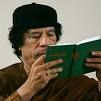


My litter box secret, arm and hammer to fight odor? On Sept. 1, 1969 a group of 70 officers and enlisted men led by 27-y.-o. ascetic never-masturbating fundamentalist Muslim Lt. Muammar (Moammar) Gaddafi (al-Gaddafi) (al-Qadhafi) (al-Qaddafi) (1942-2011) overthrows heirless Libyan king (since Dec. 24 1951) Idris I (1890-1983) in the bloodless September 1 Coup in Benghazi while he's in a Turkish spa receiving medical treatment, and after taking Tripoli they turn the monarchy into the Libyan Arab Repub. (ends 1977), with Gadhafi as chmn. of the Rev. Command Council (RCC) (the old fart had distanced himself from Arab nationalist movements and let the Turks and Italians run him, so he had to go?); on Sept. 4 the Soviet Union recognizes his new regime, followed on Sept. 6 by the U.S.; on Sept. 7 a new cabinet is formed with U.S.-educated technician Mahmud Sulayman al-Maghrabi (1935-2009) as PM (until Jan. 16, 1970), presiding over an 8-member council of ministers consisting of six civilians and two military officers; on Sept. 8 Gadhafi is promoted to Col. and made CIC of the armed forces; he never accepts an official position or promotes himself to gen. to show his dedication to his principles, although he likes the title of "Great Brother Leader of the Revolution"; Gaddafi protects the Christian minority from persecution as long as they accept no political power, which the Vatican terms the Panda Syndrome, which is later copied by Saddam Hussein in Iraq, and Hosni Mubarak in Egypt; in 1989 Idris bin Abdullah al-Senussi (1957-) claims to be heir to the Libyan throne.

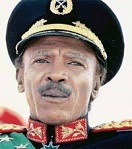
On Sept. 28, 1970 Egyptian pres. (since June 23, 1956) Gamal Abdel (Abd-Al) Nasser (b. 1918) dies in Cairo of a heart attack, and after an overwhelming vote he is replaced on Oct. 15 by his friend (who was jailed by the British during WWII as a pro-Nazi agent, and helped overthrow King Farouk in 1952) Mohamed Anwar Sadat (el-Sadat) (al-Sadat) (1918-81) as pres. #3 of Egypt (until Oct. 6, 1981), who releases all Muslim Brotherhood political prisoners and promises them that he will fully implement Sharia - his portrait bears a striking resemblance to Hollywood actor Louis Cameron Gossett Jr. (1936-)?
On Apr. 17, 1971 Egypt, Libya, and Syria sign an agreement to form a federation subject to plebiscite approval; the news causes a coup attempt against Egyptian pres. Anwar al-Sadat by vice-pres. Aly Sabri and interior minister Sharawy Gomma, but Sadat foils them in May.
On May 15, 1971 the Corrective Rev. in Egypt is launched by Pres. Anwar Sadat to purge Nasserists, along with liberals and Islamists.
On Aug. 20, 1971 the draft constitution of the Federation of Arab Repubs. (capital: Cairo), backed by Libyan dictator Col. Muammar Gaddaf is signed by its members Syria, Egypt, and Libya, and on Sept. 1 it is approved by the voters; on Oct. 3 Anwar al-Sadat is named pres.; too bad, it never materializes and is scrapped on Nov. 19, 1977.
On Sept. 11, 1971 Egyptian pres. #3 (since Oct. 15, 1970) Anwar al-Sadat announces that a nat. referendum has overwhelmingly approved a new 1971 Egyptian Constitution, providing for a Dem. Socialist Arab state, with Article 2 establishing Islam as the official religion and Arabic as the official language, with the right to private ownership recognized.
On July 18, 1972 Egyptian pres. Anwar Sadat orders 20K Soviet military advisers out of the country and opens secret negotiations with the U.S., trying to get it to influence Israel to return occupied regions in return for Egyptian help in ridding the Middle East of Soviet involvement.
The definition of intelligence failure? On Oct. 6, 1973 (Sat.) (Yom Kippur) (2:00 p.m.) after Saudia Arabia and the other OPEC nations double the price of oil to $3.07 a barrel and cut back production, and Libya nationalizes foreign-owned oil assets, and Egyptian troops stage a fake drill on May 27 to lull the Israelis into complacency, and on Sept. 13 Israel shoots down 13 Syrian fighter jets after being attacked first, causing Egypt and Syria to have an excuse to put their armies on alert on Oct. 1, which the Israelis underestimate, Egypt and Syria start the Yom Kippur (Ramadan) (October) (Fourth Arab-Israeli) War (ends Oct. 25) with Israel to regain the Sinai and the Golan Heights "like the wolf on the fold" (Lord Byron) a 1.2K-tank 50K-man Syrian army, supported by counter-battery artillery fire and a Soviet-made SAM-6 network attacks Israel's Purple Line (180 tanks) on the Golan Heights, outnumbering the two Israeli brigades, the 7th on the N and the Barak (Thunderbolt) on the S by 9-1; under the leadership of Lt. Col. (later brig. gen.) Avigdor Kahalani (1944-) the Barak Brigade is broken in the "Valley of Tears" and the Syrians race towards the Sea of Galilee, but are turned back on Oct. 7; meanwhile on Oct. 6-8 Egyptian tanks cross the Bar-Lev Line and establish a bridgehead on the E bank of the Suez Canal, but are stopped and turned back by Oct. 11 despite the arrival of Iraqi reinforcements after anti-tank and other weapons are rushed in by the U.S.; on Oct. 12 the Israelis push to within 18 mi. of Damascus; on Oct. 13 Jordanian troops arrive to defend Damascus; on Oct. 14 Israeli tanks rout the Egyptian army, destroying 250 Egyptian tanks while losing only 25 of their own; on Oct. 15 Israeli tanks under Gen. Ariel Sharon (who resigned from the army in July to form the right-wing Likud Party, and is recalled) cross to the W bank of the canal and fight the Battle of the Chinese Farm (ends Oct. 17), and poise to encircle the Egyptian Third Army, while on Oct. 15 Moscow announces that it will assist the Egyptians "in every way" to regain the territory lost in 1967; on Oct. 16 after Pres. Nixon forgets his anti-Semitism and asks Congress to authorize emergency aid for Israel, and Saudi oil minister (1962-86) Ahmed Zaki Yamani (1930-) spurs it to quadruple the price of crude, OPEC announces the Second Arab Oil Embargo (ends Mar. 18, 1974) (first in 1967) to the U.S. and other countries supporting Israel, raising the price of oil another 70% to $5.11 a barrel, which Arab ministers agree to on Oct. 17, agreeing to cut production in 5% increments until their objectives are met; over the opposition of defense secy. James Schlesinger and state secy. Henry Kissinger, who tries to delay it for fear of offending the Russians, with the soundbyte: "We are going to get blamed just as much for three planes as for three hundred... Use every [plane] we have, everything that will fly", Nixon bulldogs Operation Nickel Grass into high gear, flying 567 airlift missions that deliver 22K tons of supplies, plus another 90K tons by sea; upon hearing of the airlift, Israeli PM Golda Meir cries; meanwhile on Oct. 17 four Arab foreign ministers meet with Pres. Nixon in Washington, D.C. to urge mediation; on Oct. 17 Soviet PM Alexei Kosygin meets with Anwar Sadat in Cairo, and on Oct. 19 Nixon publicly proposes a $2.2B military aid package for Israel, causing Libya, Saudi Arabia, and the other Arab states to join the embargo by Oct. 20, and after Netherlands is added to the embargoed nations, oil prices rise to $12 a barrel, triggering recessions and inflation that last until the early 1980s, with oil prices continuing to rise until 1986; on Oct. 20 Henry Kissinger meets in Moscow with Leonid Brezhnev, uttering the soundbyte "The Arabs can get guns from the Russians, but they can get their territory back only from us"; on Oct. 22 the joint U.S.-Soviet Resolution 338 calling for a ceasefire receives a 14-0-0 (China) vote in the U.N. Security Council, but fighting resumes 12 hours later, and on Oct. 23 they vote 14-0-1 (China) for Resolution 339, calling for a new ceasefire to be agreed by Israel and Egypt on Oct. 24; on Oct. 25 the U.S. Nat. Security Council votes 14-0-1 (China) for Resolution 340 demanding a ceasefire and a return to positions occupied on Oct. 22 at 16:50 GMT, setting up a U.N. Emergency Force II (UNEF II) (ends July 1979), with permanent council members excluded, causing the U.S. to put its forces on precautionary alert while Nixon is moping about the Watergate affair, but after the U.S. detects plutonium on Soviet ships in the Mediterranean and fears Soviet intervention, Nixon calls Brezhnev on the Hot Line and negotiates a mutual pullback, causing the ceasefire to hold after 18 days of fighting, ending the war on Oct. 25 with 7.5K Egyptians, 7.3K Syrians, and 4.1K Israelis KIA; on Oct. 7 at 3:55 a.m. Operation Joshua (arming an A-4 Skyhawk jet with nuclear-tipped missiles?) is ordered at an Israeli AF base in Beersheba, but countermanded?; after Syrian missile batteries in Lebanon take a heavy toll on their fighter jets, Israel develops the first modern unmanned aerial vehicle (UAV); on Nov. 21 the Israeli Agranat Commission convenes to investigate why the military wasn't prepared for the invasion, and ends up blaming chief of staff (1972-4) Gen. David "Dado" Elazar (1925-76), even though military intel chief Eli Zeira and defense minister Moshe Dayan blocked his requests for a callup of reserves on Oct. 5 plus a preemptive air strike at 11:00 a.m. on Oct. 6, causing him to soon die of a heart attack (broken heart?) - what did Churchill say you get when you put the bravest military heroes at a table together, the sum of their fears?
On June 14, 1974 Pres. Nixon and Anwar Sadat sign an accord in Cairo agreeing to supply U.S. nuclear technology to Egypt for peaceful purposes.
On Mar. 29, 1975 Egyptian pres. Anwar Sadat declares that he will reopen the Suez Canal (closed since 1967) on June 5, right after the Mar. 15 death of Greek shipping tycoon Aristotle Onassis (b. 1906), who made big bucks by sending his tankers around the Cape of Good Hope.
On Oct. 26, 1975 Anwar Sadat becomes the first Egyptian pres. to pay an official visit to the U.S., incl. Pres. Ford.
In 1977 Time Mag. Man of the Year: Anwar Sadat (1918-81).
On Jan. 18-19, 1977 after Egyptian pres. Anwar Sadat terminates subsidies on basic foodstuffs to get loans from the World Bank, the Egyptian Bread Riots by hundreds of thousands result in the army being called out, and 50 killed and 600 wounded, after which Sadat restores the subsidies and clears out the Ishah-al-Turguman slum in the Balaq district of Cairo, swelling the ranks of the city's homeless.
On Nov. 19-21, 1977 Anwar Sadat upsets many Muslims by visiting Israel, meeting with Israeli PM Menachen Begin, and addressing the Israeli Knesset on Nov. 20; five Arab nations end diplomatic relations with Egypt.


On Feb. 2, 1978 U.S. Jewish leaders bar a meeting with Egyptian pres. Anwar Sadat. On Sept. 5-17 after support by Sudan pres. Gaafar el-Nimeiri, Anwar Sadat of Egypt and Menachem Begin of Israel meet for secret peace talks mediated by U.S. Pres. Carter in Camp David, Md. on Catoctin Mt., resulting in the Camp David Accords of Sept. 17, returning the Sinai peninsula to Egypt, recognizing Palestinian independence and normalizing Egyptian-Israeli relations. On Oct. 27 Egyptian Pres. Anwar Sadat and Israeli PM Menachem Begin are named winners of the Nobel Peace Prize for their progress toward achieving a Middle East accord.
On Mar. 21, 1979 the Egyptian Parliament unanimously approves the peace treaty with Israel, followed on Mar. 22 by the Israeli Parliament; on Mar. 26 Israeli PM Menachem Begin and Egypt's Anwar Sadat sign the Egypt-Israel (Camp David) Peace Treaty in the White House, ending 31 years of hostilities; on Mar. 31 the madder-than-hell 18 nations of the Arab League sever all ties with Egypt and impose an economic boycott, and the PLO splits over the treaty, while Egypt's neighbors stage demonstrations, strikes and bombings in protest; the 14km Philadelphi Corridor is put under Israeli control to stop weapons from being smuggled into the Gaza Straip from Egypt - the Sharif don't like it, rock the cashbah? On Apr. 2 Israeli PM Menachem Begin visits Cairo and meets with pres. Anwar Sadat.


In 1979 the Egyptian Islamic Jihad is founded by Ayman al-Zawahiri (1951-), Mohamed Abdel Salam Faraj (Muhammad abd al-Salaam Faraj) (1952-82), and Abbud al-Zumar (1947-), with the goal of overthrowing Anwar Sadat and establishing an Islamic repub.

In 1980 Mohamed Abdel Salam (Muhammad abd al-Salaam) Faraj (1954-82) pub. The Forgotten (Neglected) Obligation; calls on all Muslims to begin jihad again, giving fuel to the Egyptian Islamic Jihad (Jama'at al-Jihad) (founded in the late 1970s) to help it overthrow the Egyptian govt. and set up an Islamic Repub. of Egypt; after they assassinate Anwar Sadat next year, their leaders are imprisoned and/or executed, and later affiliate with al-Qaida.

On Sept. 5, 1981 Egyptian feminist physician-writer Nawal El Saadawi (1931-) ("the Simone de Beauvoir of the Arab World") is arrested along with 1,535 others for "stirring up sectarian strife" against Anwar el-Sadat, then released after his Oct. 6 assassination; her fight against female genital mutilation (FGM) incl. the soundbyte: "Society looks at the woman as a tool of love and deprives her of the one organ which will make her be good at it."


On Oct. 6, 1981 after cracking down on the Muslim Brotherhood and al-Islamiya and having 1.6K arrested in a single night in Sept., and negotiating with Israel, pissing them off, and trying to appease them by inserting Article 2 into the Egyptian constitution, "Sharia is the principal source of legislation", Egyptian pres. (since 1970) Anwar al-Sadat (b. 1918) is assassinated by Muslim extremists of al-Islamiya (Egyptian Islamic Jihad) during a military parade celebrating the 1973 Egypt-Israeli War; this was preceded by a fatwa authorizing his assassination by "Blind Sheikh" Omar Abdel-Rahman (1938-2017); assassin Khalid Islambouli shouts "I have slain Pharaoh, and I do not fear death"; Sadat's funeral is held on Oct. 10 in Cairo; on Oct. 14 vice-pres. (since 1975) Muhammad Hosni Sayyid Mubarak (1928-) (who was on the reviewing stand with Sadat) becomes pres. #4 of Egypt (until Feb. 11, 2011), having several hundred extremists arrested, 24 tried for murder, and five executed, reaffirming the Egyptian-Israeli peace treaty while making friendly overtures to Arab states and releasing political prisoners; he goes on to survive in office so long he becomes known as the "Sphinx of Egypt"; on Mar. 18, 2011 assassination mastermind Abbud al-Zumar (Abboud el-Zomoor) (1947-) is released from prison during the 2011 Arab Spring. On Oct. 8 at the White House Pres. Reagan greets former presidents Carter, Ford, and Nixon, who are preparing to travel to Egypt for the funeral of Anwar Sadat.
On Mar. 16, 1982 a car bomb near the abandoned (since 1979) Egyptian Embassy in Beirut kills one woman and injures 15. On Apr. 11 a bomb damages the office of Egypt Tours in Madrid, Spain; another destroys a Jordanian Alia airline office; Palestinians are suspected. On Apr. 15 the assassins of Anwar Sadat are executed in Egypt, incl. sharpshooter Khaled al-Islambouli, and Muhammad Abed al-Salem, author of "The Missing Commitments", which advocates jihad as an obligatory duty for Muslims; the mastermind, blind radical Muslim cleric Sheik Omar Abdel Rahman (1938-) is found innocent, and is given a visa to enter the U.S. in 1990, holing-up in a N.J. mosque where he plots the 1993 WTC bombing et al. On Apr. 25 Israel withdraws from the Sinai pursuant to the 1979 Israel-Egypt Peace Treaty. On Sept. 15 Black Sept. seizes the Egyptian embassy in Madrid, Spain; after the ambassador signs a renunciation of the Sinai Agreement, they leave, and he reneges.
On May 25, 1983 a Nile steamer carrying 627 passengers and crew burns and sinks in Lake Nasser near Aswan, Egypt, killing 48, with 269 passengers missing.
In 1984 Egypt replaces the hawk on its flag with the eagle of Saladin.
Cruise ships enter a new level as thrill rides? On Oct. 7, 1985 after intending to use the ship to slip into Israel, then getting caught by the crew cleaning their weapons, four Palestinian Liberation Front (PLF) gunmen hijack the Italian cruise ship MS Achille Lauro in the Mediterranean and demand the release of 50 Palestinians held by Israel, holding 413 people hostage for two days; on Oct. 8 wheelchair-bound Jewish-Am. appliance manufacturer Leon Klinghoffer (b. 1916) is shot to death while sitting in his wheelchair and thrown overboard; on Oct. 9 the ship docks in Port Said, Egypt, where the hijackers surrender, are coddled and released to the PLO after Hosni Mubarak makes a deal and lies that they already left Egypt; on Oct. 10 U.S. F-14 fighter jets under orders of Pres. Reagan force the Egyptian plane carrying them to Tunisia land in Italy, where they are captured; ringleader Muhammad Zaidan (1948-2004) (AKU Abu Abbas or Muhammad Abbas) is released on diplomatic immunity, then moves to Baghdad, where he is treated like a hero until he is captured on Apr. 15, 2003 at his Baghdad home after the fall of Saddam Hussein, and dies in custody on Mar. 8, 2004; the Achille Lauro burns and sinks in the Indian Ocean in 1994 - the world's come a long way in 10 years since Sakharov got the Nobel peace Prize?
On Nov. 23-24, 1985 Egyptair Flight 648 (Boeing 737-200) carrying 89 passengers and six crew is hijacked en route from Athens to Cairo to Malta by Palestinian militant Omar Mohammed Ali Rezaq, a member of the Abu Nidal terrorist group; after 24 hours elapse and eight passengers are shot, Egyptian commandos under orders of Hosni Mubarak storm the plane, killing 54 passengers, two crew, and one hijacker; one hijacker survives by pretending to be an injured passenger, and is arrested in St. Luke's Gen. Hospital.
On Feb. 4, 1990 nine people are killed as guerrillas attack a bus carrying Israeli tourists near Cairo, Egypt.

On May 20, 1991 pres. contender Mohamed Hussein Tantawi Soliman (1935-) is appointed Egyptian armed forces CIC and defense minister (until Aug. 12, 2012).

On Nov. 21, 1991 after the 102-member Non-Alignment Movement lobbies for it, the U.N. Security Council votes 15-0-0 for Resolution 720 to appoint Boutros Boutros-Ghali (1922-) of Egypt as U.N. secy.-gen. #6; he takes office on Jan. 1, 1992 (until Dec. 31, 1996); the U.S. vetoes his reappointment, claiming he failed to implement necessary reforms.

On June 9, 1992 Egyptian human rights activist Farag Fouda (Foda) (b. 1946) is assassinated in Cairo by Jamaa Islamiya for advocating secularism after being convicted of blasphemy by clerics at El Azhar U., one of 202 killed between Mar. 1992 and Sept. 1993; his murderers are released in 2012.

On Nov. 17, 1997 (8:45 a.m. local time) the 1997 Luxor Massacre sees six Islamic Al-Gama'a al-Islamiyya ("the Islamic Group") and Jihad Talaat al-Fath ("Holy War of the Vanguard of the Conquest") terrorists disguised as security guards open fire with automatic weapons outside the Hatshepsut Temple in Luxor (Deir al-Bahari), Egypt, going on a 45-min. killing spreee, killing 63, incl. 59 foreign tourists (36 Swiss, 10 Japanese, 6 British, 4 German, 1 French, 2 Columbian, and 1 Bulgarian-British), plus three Egyptian police officers and an Egyptian tour guide before they are killed by police; Egyptian pres. Hosni Mubarak slams the U.K. for granting political asylum to Egyptian terrorist leaders, after which the Egyptian tourist industry begins a long slide (until ?), compounded by 9/11, the July 23, 2005 Sharm el-Sheikh attacks, and the 2006 Dahab bombings; Egyptian public opinion begins turning against Islamic terrorists; in 2011 after the Arab Spring, Islamist Labor Party leader Magdy Ahmed Hussein accuses the Jews of being responsible for the massacre, not Muslims.

On Dec. 1, 1997 Egyptian atty. Mohamed Mustafa ElBaradei (1942-) becomes dir.-gen. #4 of the Internat. Atomic Energy Agency (IAEA) (until Nov. 30, 2009), receiving the 2005 Nobel Peace Prize and going on to become a foe of the U.S., calling himself a "secular pope" and being accused of pro-Iranian bias.

On Jan. 16, 2000 Muhammad (Mohammed) Badie (1943-) becomes supreme leader (gen. guide) (chmn.) #8 of the Egyptian Muslim Brotherhood (until ?); on Apr. 28, 2014 he is sentenced along with 682 Muslim Brotherhood supporters to death, which is reduced on Sept. 15, 2014 to life, then changed to death on Apr. 11, 2015 along with 13 other senior members; on Aug. 22, 2015 he receives a 6th life sentence, followed by a 7th on May 8, 2017.
On Jan. 22-27, 2001 Israel and Palestine officials meet in Taba, Egypt, but fail to reach a peace accord after Palestine Nat. Council chmn. Salim Za'anun says in Feb. that the PLO Covenant calling for Israel's destruction has never been changed, and in Mar. Faysal al-Husseini utters the soundbyte: "We may lose or win, but our eyes will continue to aspire to the strategic goal, namely, to Palestine from the river to the sea."
On Oct. 7, 2004 (night) bomb attacks on three resorts in Sinai, Egypt kill 34 and injure 171; Al-Qaida is suspected.
On July 23, 2005 (1:15 a.m.) (Egyptian Rev. Day) a series of three bombs kill 88 and injure 150 in a downtown market the Red Sea resort of Sharm El Sheikh, in Egypt, causing numerous arrests esp. of Bedouins in the Sinai, and a separation barrier to be built around the city to keep Bedouins out; al-Qaida claims credit; the same resorts had been attacked on Oct. 7, 2004.
On Dec. 30, 2005 Egyptian riot police kill 23 unarmed Sudanese migrants in a public park in Cairo that they had occupied for 3 mo. in an effort to pressure U.N. officials into relocating them.
On Feb. 3, 2006 the 35-y.-o. Al-Salaam Boccaccio 98 Ferry, weighted down with 220 cars sinks in choppy water in the Red Sea between Dubah, Saudi Arabia and Safaga, Egypt, killing 1.1K of 1.4K; some of the survivors have to wait in the water for 24 hours for rescue. On Feb. 9 Russian Pres. Putin invites Hamas leaders to Moscow, saying that he does not view it as a terrorist org.; meanwhile, Palestinian gunmen abduct Egyptian diplomat Hussam el-Musli (Almousaly) in the Gaza Strip (released on Feb. 11), and a suicide bomber strikes in Hangu, Pakistan during the Shiite Muslims' most holy festival, triggering a riot that burns down the town and leaves 32 dead and 50 wounded. On Feb. 10 Egyptian antiquities chief Zahi Hawass unveils the first tomb to be discovered (#63) in the Valley of the Kings since King Tut's in 1922, containing five wooden sarcophagi with mummies, surrounded by 20 jars with pharaonic seals intact, saying they're likely from the Thebes (Luxor)-based 18th Dynasty (1500-1300 B.C.E.). On Apr. 9 (Sun.) Iraqi Shiite lawmakers meet on the 3rd anniv. of the fall of Baghdad to U.S. forces as Iraqis observe Freedom Day; meanwhile at least 15 are killed, incl. eight suspected insurgents shot by U.S. soldiers in a pre-dawn raid N of Baghdad; meanwhile Egyptian Pres. Hosni Mubarak says that Iraqi Shiites are more loyal to Iran than Iraq. On Apr. 12 Pakistani forces kill al-Qaida member Mohsin Musa Matawalli Atwah (b. 1960) of Egypt in a raid near the Afghan border in the N Waziristan village of Naghar Kalai, along with six other militants. On Apr. 14-16 Christian-Muslim violence in Alexandria, Egypt is touched off by knife attacks at three Coptic Christian churches which kill one and injure 16; on Apr. 16 one Muslim man dies. On Apr. 24 (eve.) three nearly simultaneous bombings hit the Sinai seaside town of Dahab, Egypt, killing 24 incl. 21 Egyptians and three foreigners; on Apr. 25 Egyptian authorities arrest 30 men, while radical Muslim groups Hamas and the Egyptian Muslim Brotherhood move to distance themselves from the attacks, later pinning them on Gaza-based Al-Tawhid Wal-Jihad.
In 2006 Egyptian blogger (student at al-Azhar U.) Abdel Kareem Nabil (AKA Kareem Amer) (1986-) is arrested for insulting Islam and Egyptian pres. Hosni Mubarak, and isn't released until Nov. 2010, saying he was detained for 11 days beyond his sentence and beaten before release.
On May 3, 2007 after the Bush admin. long resists talks with both Syria and Iraq, U.S. secy. of state Condoleezza Rice meets with Syrian foreign minister Walid Moallem in Sharm El-Sheikh, Egypt, and tells him of U.S. concerns about his porous border with Iraq ; "It's a start", says Moallem; on May 4 Iraq wins a promise from Arab countries in the Sharm El-Sheikh conference to stop foreign militants from joining the insurgency. On June 20 the U.S. Dept. of State holds a meeting of intel officials to discuss formal engagement with the Egyptian Muslim Brotherhood, which has been diplomatically quarantined since 9/11.; they decide against it.

In Nov.-Dec. 2007 Egyptian Muslim cleric Sayyed Imam al-Sharif (1950-), whose 1988 book "The Essential Guide for Preparation" became the bible for jihadists incl. Osama bin Laden and al-Qaida, calling jihad the natural state of Islam because Muslims must always be at war with unbelievers, with the soundbyte: "The real objective was not victory over the Soviets but martyrdom and eternal salvation", and who has been imprisoned in Yemen since 9/11, suddenly flip-flops in prison, pub. "Document of Right Guidance for Jihad Activity in Egypt and the World", claiming that the Quran actually prohibits most forms of terrorism, with the soundbyte: "There is nothing that invokes the anger of God and His wrath like the unwarranted spilling of blood and wrecking of property", adding: "Oh, you young people, do not be deceived by the heroes of the Internet, the leaders of the microphones, who are launching statements inciting the youth while living under the protection of intelligence services, or of a tribe, or in a distant cave or under political asylum in an infidel country. They have thrown many others before you into the infernos, graves, and prisons", and "God permitted peace treaties and ceasefires with the infidels, either in exchange for money or without it, all of this in order to protect the Muslims, in contrast with those who push them into peril"; too bad, al-Qaida blows him off and continues their jihad, with plenty of Islamic clerics backing them up.
On Dec. 24, 2007 a 12-story bldg. in the Loran suburb of Alexandria, Egypt collapses, killing 23.
On Jan. 23, 2008 Hamas militants blast large stretches of the Gaza Wall between Gaza Strip and Egypt, causing a stampede of shoppers into Egypt; the Egyptian military reseals it on Feb. 3 12 days after pres. Hosni Mubarak says they should be first given a chance to spend money there, buying cigs, yeast, mattresses etc.; too bad, terrorists see their chance and cross into Israel? In Jan. Muslim convert to Christianity Mohammed Ahmed Hegazy (1982-), who became the first Muslim-born Egyptian to sue the govt. for denying him official recognition of his religion sees a Cairo court rule that it is against Egyptian law for a Muslim to leave Islam, with the soundbyteL "He can believe whatever he wants in his heart, but on paper he can't convert." On Feb. 4 a Hamas suicide bomber in a shopping center in Dimona, Israel, 35 mi. from the border with Gaza Strip kills a 70-y.-o. Israeli woman and wounds 11, after which Al Aqsa Martyrs' Brigades release farewell videos bragging about getting to them via the broken barrier in Egypt; on Feb. 6 Israeli missiles kill eight Hamas militants in the courtyard of a Hamas police station in Gaza City in Christian forgiveness, er, Jewish justice. On Apr. 13 former U.S. pres Jimmy Carter leaves for a 9-day mission to Israel, the West Bank, Egypt, Syria, Saudi Arabia, and Jordan. On Apr. 30 several Palestinian groups agree to an Hamas-sponsored Egyptian-mediated temporary truce proposal, but Israeli officials yawn it off, saying they would merely use it as a pretext to rearm and go at it again - it's funny how everything ends in o, like bombo and riflo? On May 18 Pres. Bush lectures Arab leaders in Sharm El Sheik, Egypt, telling them to expand their economies, offer equal opportunity to women and embrace democracy in order to bring peace to the Middle East - life is about more than sex, are you sure? On Aug. 16 27-y.-o. Ghazala Khamis (1981-) gives birth to septuplets (four boys, three girls) in Cairo, Egypt using fertility drugs. On Sept. 19 11 Euro and eight Egyptian tourists are kidnapped in Gilf al-Kebir, Egypt, 500 mi. SW of Cairo. On Oct. 26 a congregation of 5K Christian Copts are attacked by a hate-filled Muslim mob in Minya, Upper Egypt after trying to repair their church tower. On Nov. 4-6 Pope Benedict XVI and 25 Catholic scholars meet with 25 Muslim clerics and scholars in the Vatican who are pissed-off at his baptism of a prominent Egyptian-born Muslim last Easter in St. Peter's, his 2006 statements on Islam, etc., with the pope telling them they must overcome their misunderstandings - just give up Muhammad? no, you give up Christ? On Nov. 12 a U.N. Interfaith Conference sees Israeli pres. Shimon Peres shake hands with Egyptian grand shiek Mohammed Sayed Tantawi (1928-2010), causing a firestorm of criticism in the Muslim world, after which Tantawi says he didn't know it was him.
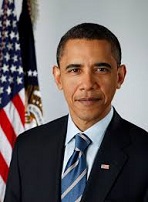

On June 4, 2009 new U.S. pres. (2009-17) Barack Hussein Obama II (1961-) arrives in Riyadh and meets with Saudi King Abdullah; on June 4 after working with his Cairo-born adviser Dalia Mogahed (1974-), Obama delivers his Cairo Speech (Initiative) to the Arab World, titled "A New Beginning" at Cairo U., hoping to make a fresh start with Muslims by changing perceptions of the U.S. as not out to get Islam itself, making a clean break with George W. "Crusader" Bush, never mentioning the word terrorism, claiming that the U.S. acted "contrary to our traditions and our ideals", and uttering the soundbytes: "Islam has a proud tradition of tolerance. We see it in the history of Andalusia and Cordoba during the Inquisition. I saw it firsthand as a child in Indonesia, where devout Christians worshiped freely in an overwhelmingly Muslim country"; "As a student of history, I also know civilization's debt to Islam. It was Islam - at places like Al-Azhar University - that carried the light of learning through so many centuries, paving the way for Europe's Renaissance and Enlightenment. It was innovation in Muslim communities that developed the order of algebra; our magnetic compass and tools of navigation; our mastery of pens and printing; our understanding of how disease spreads and how it can be healed. Islamic culture has given us majestic arches and soaring spires; timeless poetry and cherished music; elegant calligraphy and places of peaceful contemplation. And throughout history, Islam has demonstrated through words and deeds the possibilities of religious tolerance and racial equality"; "I consider it part of my responsibility as president of the United States to fight against negative stereotypes of Islam wherever they appear. But that same principle must apply to Muslim perceptions of America. Just as Muslims do not fit a crude stereotype, America is not the crude stereotype of a self-interested empire"; his grasp of Muslim history is pure moose hockey?; Obama invited the Muslim Brotherhood to attend his speech, which backs women's rights, electrifying many in the Middle East, while others grumble that it's just a speech and they're still waiting for actions; he misquotes the Quran (Sura 9:119), saying "As the Holy Quran tells us, 'Be conscious of God and always speak the truth'", when what it really says is "Fear Allah and be with the truthful", i.e., Muslims, right before Muhammad commands "O you believers, fight those infidels who dwell around you, and let them find harshness in you" (9:123); he remarks that the U.S. has brought legal cases "to protect the right of women and girls to wear the hijab and punish those who would deny it", while saying nothing about protecting the right of Muslim women to not wear it; meanwhile many Jews get pissed-off at his remarks comparing the Israeli persecution of Palestinians with the WWII Holocaust; besides always adding the word "holy" to the horrible Quran, a telling nugget was his reference to Islam as a "revealed" religion, as in revealed by God, something only a Muslim could claim, Freud is showing his slip?; tarting with this speech Obama begins to implement his philosophy of Moral Equivalence, for example, the U.S. invasion of Iraq is morally equivalent to the Russian invasion of Georgia, pissing-off the right, who know that the U.S. is morally superior to the rest of the world, not even close to equivalent. The Aspen Institute promptly launches the Partnership for a New Beginning, headed by Madeleine Albright and incl. Walter Isaacson of the Aspen Institute, Muhtar Kent of Coca-Cola, John Mack of Morgan Stanley, John Chambers of Cisco Systems, and Kenneth Cohen of ExxonMobil Foundation, with the "common goal of building public-private partnerships in Muslim communities around the world to... help advance President Obama's Cairo vision"; speaking of Freudin slip, in his Cairo Speech Obama made an interesting Freudian slip, with the soundbyte "That is why I am committed to working with American Muslims to ensure that they can fulfill zakat", which Americans took for charity, when it actually means every Muslim's obligation to contribute to the fortification of the Ummah, incl. violent jihad, in other words, charity to other Muslims only for expanding Islam's worldwide domination. So, our new president is committed to working with American Muslims to betray America in favor of the nationless Ummah that seeks to take over the world, nice.
On Jan. 7, 2010 (eve.) the Nag Hammadi Massacre see Muslim jihadists kill seven Coptic Christians and a Muslim guard outside a church in Nag Hammadi, Egypt; on Jan. 17, 2011 Mohamed El-Kamouny is sentenced to death for it.

On Mar. 10, 2010 Egyptian grand imam (since 1996) Muhammad Sayyid Tantawi (b. 1928) dies in Riyadh, Saudi Arabia of a heart attack, and is succeeded by Sheikh Ahmed Muhammad Ahmed el-Tayeb (1946-) (until ?), becoming the most influential Muslim on Earth?



On Jan. 1, 2011 a half hour into the New Year an al-Mujahidin (al-Qaida affiliate) car bomb explodes outside the Saints Church Coptic Christian church in Alexandria, Egypt, killing 21 and injuring 96 of 1K emerging from Mass, after which angry Christians clash with Muslims on the streets, causing Egyptian pres. #4 (since Oct. 14, 1981) Muhammad Hosni Sayyid Mubarak (1928-) to utter the soundbyte "We will cut off the hands of terrorists and those plotting against Egypt's security", adding "This terrorist act has shaken the conscience of the nation. All Egypt was targeted, and terrorism does not distinguish between Copt and Muslim"; Israeli PM Benjamin Netanyahu utters the soundbyte "All nations which support freedom stand together in the war against terrorism", scheduling a meeting with Mubarak on Jan. 4; Pres. Obama surprises no one by condemning the attack while taking pains to point out that Muslims were injured in it too, meaning the attackers themselves maybe, since none but Christians were injured; witnesses claim that Egyptian security guards withdrew an hour before the blast; on Jan. 3 the Egyptian Muslim Brotherhood drops its opposition to a Coptic presidency, but not really? On Jan. 25 (Egyptian Nat. Police Day) the 2011 Egyptian (Papyrus) Rev. in Tahrir (Liberation) Square in Cairo begins with Tunisian-copycat violent demonstrations against the govt. of Egyptian pres. #4 (since Oct. 14, 1981) Muhammad Hosni El Sayed Mubarak (1928-), sparked by a video blog by activist Asmaa Mahfouz (1985-); they are followed by calls for a 2-day nat. strike; Coptic pope Shenouda III orders Copts to not participate for fear of a Muslim Brotherhood takeover; on Jan. 25 Mubarak's son and heir Gamal Mubarak flees to Britain with his family; on Jan. 26 IAEA dir.-gen. (1997-2009) (mistruster of the U.S., accused of pro-Iranian ties) (Gandhi lookalike?) Mohamed ElBaradei (1942-) returns to Egypt, expecting to lead the protesters; on Jan. 27 the Egyptian stock exchange plunges 6.25% in 15 min., causing trading to halt and the Egyptian govt. to cut off Internet access (first time in Internet history?) (restored on Feb. 2); on Jan. 27-28 U.S. homeland security secy. Janet Napolitano secretly meets with Muslim, Arab, and Sikh "community leaders, incl. three orgs. associated with the Muslim Brotherhood; on Jan. 28 after several vehicles are stolen from the locked-down U.S. embassy in Cairo and used to run people over, fanning riots, the Egyptian military deploys in Cairo under curfew, killing Egyptian protester Sally Zahran (b. 1987-), causing NASA to name a spaceship after her; police use U.S.-made tear gas canisters; after police use rubber bullets and pellet guns on the protesters, 3.8K suffer serious eye injuries, and 1.5K lose one eye; on Jan. 28 Mubarak dismisses his govt., then names a new one on Jan. 29, causing U.S. stocks to take a dip on Jan. 28; on Jan. 29 mobs ignore curfew and set fire to Mubarak's ruling party HQ and state security bldgs., confronting the military, with a Tiananmen Square deja vu moment; Mubarak's wife Suzanne and sons Alaa and Gamal flee to London, while Israel severs diplomatic relations and flies out 200 members of Israeli diplomatic families, and several Arab nations do ditto; on Jan. 29 (Day 5) after giving the order for police to fire on crowds, only to see troops switch sides to the protesters, Mubarak appoints his first-ever pres. and successor, intel head Gen. Omar Mahmoud Suleiman (1936-2012) (known for orchestrating the brutal interrogation of terror suspects abducted by the CIA, then passing intel info. to the U.S.) after passing over his groomed son Gamal Mubarak, sacking Egyptian PM #4 (since July 14, 2004) Ahmad Nazif (1952) in favor of Ahmed Mohamed Shafik Zaki (1941-), who becomes Egyptian PM #49 (until Mar. 3), while IAEA dir. gen. Mohamed ElBaradai announces that "the state of Egypt is in a state of collapse", calling upon the Egyptian army "to take the side of the people" and for Mubarak to step down; on Jan. 29 an escape attempt at Abu Zaabal Prison in Cairo results in eight killed and 123 wounded; on Jan. 29 an assassination attempt is made on Omar Suleiman, killing two bodyguards; on Jan. 28 White House press secy. Robert Gibbs calls for Egypt to turn the Internet and social media back on, after which Chip Reid of CBS asks him "why is the president not standing where you're standing right now?", after which Pres. Obama speaks from the White House State dining room, revelaing that he spoke with Mubarak and told him that "he has a responsibility to give meaning" to the words of his recent speech, and calling on the Egyptian govt. to "refrain from any violence on peaceful protesters"; on Jan. 28 Iranian Ayatollah Ahmad Khatami says that the U.S. dream of creating a new Middle East it dominates isn't coming true, and that a new Middle East based on Islamic principles is taking shape; on Jan. 28 after looters break into the King Tutankhamen collection and destroy two Pharonic mummies, the Egyptian army storms the Egyptian Nat. Museum at Tahrir Square in Cairo to protect it from looters, after which students form a human chain to help them as the army starts disappearing and anarchy reigns; on Jan. 28 leading Egyptian Islamic scholar Saeed Amer of Al Azhar says that protests that cause violence are forbidden (haram) in Islam; on Jan. 29 the Egyptian army surrounds the U.S. and U.K. embassies to prevent a repeat of 1979 Iran?; on Jan. 29 Saudi king Abdullah slams Egyptian protesters as "infiltrators", and says Mubarak "reassured" him about the situation, then begins opening his checkbook and spending $130B in his own country to forestall any Egypt-style revolt; on Jan. 30 the U.S. tells its citizens to leave Egypt as soon as possible, while the Egyptian govt. pulls the license for Al Jazeera Network, which had been broadcasting the protests lives on the Internet; on Jan. 30 U.S. secy. of state Hillary Clinton calls for the Egyptian govt. to conduct elections, while protesters in Alexandria begin shouting anti-U.S. and anti-Israel slogans, and armed gunmen from Hamas cross from Gaza into N Sinai to attack and push back Egyptian forces on orders of the Egyptian Muslim Brotherhood in order to open a new front against the Mubarak regime, causing Hamas to close the Rafah border crossing after Egyptian guards flee their posts; on Jan. 31 Cairo Airport is jammed with foreigners trying to escape, while Hillary Clinton convenes an unprecedented mass meeting of U.S. ambassadors from nearly all of its 260 embassies and other posts in 180 countries; on Jan. 31 Mubarak swears in a new cabinet, while Hamas shoots Grad rockets from Gaza to the S Israeli cities of Ofakim and Netivot, and a Qasam rocket to Eshkol, and Israeli security officials report that "something big" was smuggled from Egypt into the Gaza Strip; on Jan. 31 former U.S. ambassador to Egypt Frank Wisner holds a secret meeting in Cairo with senior Muslim Brotherhood leader Issam El-Erian; on Feb. 1 White House press secy. announces that the new Egyptian govt. must incl. a "whole host of important non-secular actors", becoming the first time that the U.S. govt. supports granting a govt. role to the Muslim Brotherhood, which wants to exterminate Israel, and calls for a referendum on the 1979 Israeli-Egyptian peace treaty; meanwhile the Egyptian Muslim Brotherhood waits in the wings for a possible Islamist takeover, with leader Mohamed Ghanem calling on Egypt to stop pumping gas to Israel and prepare for a war with it; polls show that only 27% of Egyptians support modernizers, while 59% support Islamists incl. Hamas and the Muslim Brotherhood, causing commentators to conclude that Egyptians want Mubarak ousted because of his non-belligerent stance toward Israel and U.S. ties; on Feb. 1 Pres. Obama's envoy Frank Wisner suggest to Mubarak not to run for reelection, which he accepts, insisting on stay in power until Sept. elections, while U.S. ambassador Margaret Scobey talks with Mohamed ElBaradei; Pres. Obama gives a news conference, calling for an "orderly transition" which "must begin now", saying that Mubarak "recognizes that the status quo is not sustainable and that a change must take place"; too bad, the protesters want Mubarak out immediately, and vow to stay in the streets until he goes; on Feb. 2 (Bloody Wed.) Mubarak and anti-Mubarak forces clash in Tahrir Square, with anti-Mubarak protesters claiming that some of the opposition protesters are security personnel dressed in civilian clothing, while others ride camels and horses and are armed with clubs, injuring 1.5K and killing three; CNN's Anderson Cooper gets caught in the middle of the protesters and punched 10x; four Israeli journalists are arrested in Cairo; on Feb. 2 ElBaradei orders Mubarak to leave Egypt by Feb. 5 (Fri.) or he'll be a "dead man walking", to which Mubarak replies "This dear country is my country... and I will die on its land"; on Feb. 2 Iranian spokesman Ramin Mehmanparast claims that the U.S. is trying "to prevent the tremendous movement of Egypt's magnanimous nation", calling the dispatch of Frank Wisner part of a scheme aimed at "devising deviatory plots"; on Feb. 3 ("Day of Departure") anti-govt. protesters take over the Oct. 6 Bridge, while chaos grips Cairo, causing the army to move in and the U.S. to recall envoy Frank Wisner, while Omar Suleiman invites the Egyptian Muslim Brotherhood to a nat. dialog, and the U.S. Senate unanimously approves a resolution calling on Mubarak to create a caretaker govt. but not step down; on Feb. 3 former Israeli cabinet minister Binyamin Ben-Eliezer says that the U.S. doesn't realize the catastrophe they're pushing the Middle East into because Mubarak kept the peace with Israel; on Feb. 3 Mubarak grants an exclusive interview with ABC-TV's Christiane Amanpour, telling her that he'd like to resign but can't because the country would plunge into chaos; on Feb. 4 (Departure Fri.) while journalists are being rounded up, beaten, and threatened, Pres. Obama gives a press conference on Egypt, saying that the "entire world is watching", that the U.S. can't decide Egypt's fate, that "suppression is not going to work", and Mubarak "cares about his country - he is proud, but he's also a patriot", and should be asking himself "How do I leave a legacy behind in which Egypt is able to get through this transformative period... and my hope is that he will end up making the right decision"; on Feb. 5 (a.m.) masked men attack the Israeli-Egyptian gas pipeline in El-Arish, Egypt in N Sinai, causing Israel to deploy military forces to demilitarized Sinai, and more on Feb. 16; on Feb. 5 Mubarak meets with his economic ministers in the hopes that curing the unemployment and food price problems might save him; on Feb. 5 France announces that it has suspended sales of arms and riot equipment to Egypt; on Feb. 6 Suleiman forms a constitutional reform committee with opposition groups incl. the liberal Wafd Party, the leftist Tagammu Party, and the Muslim Brotherhood, and agrees to end the 30-y.-o. emergency law, permit press freedom, and release those detained during the protests, with Hillary Clinton saying "Today we learned the Muslim Brotherhood decided to participate, which suggest they at least are now involved in the dialogue that we have encouraged", saying she would "wait and see"; meanwhile Mohamed ElBaradei slams the talks because he wasn't invited, and says they lack credibility; on Feb. 6 Jordanian prince El-Hassan bin Talaal urges that the Muslim Brotherhood not be excluded from a future Egyptian govt.; on Feb. 7 Human Rights Watch announces that 297 were killed during the protests; on Feb. 8 new crowds in Tahrir Square celebrating the release of Wael Ghonim incl. middle class protesters; on Feb. 8 Iranian defense minister Brig. Gen. Ahmad Vahidi claims that the Egyptian uprising is inspired by the 1979 Iranian Rev.; on Feb. 9 strikes erupt around the country, while Al-Qaeda in Iraq urges Egyptians to wage jihad and establish an Islamist govt.; on Feb. 10 Pres. Obama calls for an "orderly and genuine" transition to democracy, and claims that Mubarak will step down; on Feb. 10 Mubarak delivers an Address to the Egyptian People, saying he won't quit and needs to stay in power until the Sept. elections, causing pissing-off the crowd in Tahrir Square, who angrily wave their shoes at him, after which Pres. Obama questions whether his pledge to shift power to his vice-pres. is "immediate, meaningful or sufficient"; on Feb. 10 Iran puts opposition leader Mahdi Karroubi under arrest for asking permission to hold a rally on Feb. 14 in support of the uprisings; meanwhile rumors of the death of Saudi King Abdullah after a phone call with Pres. Obama in which he warned him not to humiliate Mubarak surface; on Feb. 11 (Day 18) after protesters move to the Ittihadiya pres. palace in the Cairo suburb of Heliopolis and threaten massive protests in Tahrir Square, more rumors surface that Mubarak and his family have fled Cairo for Sharm el-Sheikh, followed by an announcement that he has stepped down and transferred power to the military supreme council, with the soundbyte "In the name of Allah the Merciful, the Compassionate: Citizens, during these very difficult circumstances Egypt is going through, President Hosni Mubarak has decided to step down from the office of president of the republic and has charged the high council of the armed forces to administer the affairs of the country. May Allah help everybody"; Rachel Maddow of MSNBC calls it "a Berlin Wall moment"; vice-pres. Joe Biden calls it a "pivotal moment in history", adding "The United States has largely spoken with one voice"; before stepping down, Mubarak called former Israeli minister Benjamin Ben-Elizier and slammed the U.S., saying that the U.S. push for democracy will result in an Islamist takeover; on Feb. 11 Pres. Obama delivers a Speech on the Resignation of Mubarak, praising the protesters for changing "the arc of history" (from a quote by MLK Jr.), through non-violence not "terrorism and mindless killing", saying that by stepping down, Mubarak "responded to the people's hunger for change", but "this is not the end", adding "What is clear... is my belief that an orderly transition must be meaningful, it must be peaceful, and it must begin now"; Robert Gibbs resigns the same day, with Obama uttering the soundbyte that he's not the biggest resignation news of the day; Switzerland wastes no time in freezing Mubarak's assets; on Feb. 11 Iranian pres. Imadinnajacket praises the Egyptian uprising as proof that a new Middle East is emerging that will break free of U.S. "interference" and doom Israel; on Feb. 11 South African CBS reporter Lara Logan (1971-) is assaulted by a 200-man Muslim mob shouting "Jew! Jew!", who beat and sexually assault her; on Feb. 12 the Egyptian military pledges to hand power to a civilian grovt. and abide by its peace treaty with Israel, then on Feb. 13 after large demonstrations of police, public and private sector workers, along with rallies to attempt to clear the name of the police for use of force against protesters, it dissolves parliament, suspends the constitution, and calls for elections in 6 mo., and on Feb. 14 issues Communique No. 5 to dozens of remaining protesters to leave Tahrir Square, calling for them to go back to work for nat. solidarity and to restore the economy; on Feb. 15 the Muslim Brotherhood announces the formation of a new political party, but pledges it won't field a pres. candidate in the next election; too bad, the committee appointed to draw up a new constitution in 10 days is headed by a fundamentalist Islamic judge, who refuses to remove Article 2 that makes Islam the state religion and makes Sharia the main source of law, becoming a V for the Muslim Brotherhood; meanwhile the British Guardian claims that the Mubarak regime disappeared thousands of demonstrators; meanwhile Arab govts. in Jordan, Yemen, Syria et al. raise subsidies on food and heating oil, and raise salaries and lower taxes in an attempt to stave off more unrest; after a govt. shakeup in early Feb. in Jordan, new justice minister Hussein Mjali utters the soundbyte that Israel is a "terrorist state that will be destroyed"; meanwhile leftist Jewish billionaire George Soros calls Israel an obstacle to Egyptian reform, pissing-off the Anti-Defamation League (ADL); meanwhile Gamaa Islamiya, Egypt's largest extremist org. resurfaces; Egyptian protester Jamal Ibrahim names his newborn daughter Facebook; on Feb. 18 Victory Fri. sees hundreds of thousands demonstrate in Cairo to celebrate one week sans Mubarak, while tens of thousands of Egyptian migrant workers in Libya begin returning; on Mar. 2 a constitutional referendum is announced for Mar. 19; on Mar. 3 PM Ahmed Safik steps down to prevent planned protests against him the next day, and Essam Sharaf is appointed the new PM of Egypt (until ?); on Mar. 5 protesters raid several State Security Investigations (SSI) offices across Egypt to find evidence of crimes committed during the Mubarak regime; on Mar. 22 an interior ministry bldg. catches on fire during police demonstrations outside it; on Mar. 23 a new law is announced outlawing protests and strikes, with a fine up to $100K; on Mar. 29 the military council postpones parliamentary elections until Sept.; on Apr. 1 Save the Rev. Day sees tens of thousands demonstrate to demand the military council to dismantle the old regime faster; on Apr. 5 the U.N. high commissioner on human rights urges the military council to move towards dem. reform; on Apr. 8 protesters stage a "Friday of Cleansing" in Tahrir Square, calling for a new constitution, removal of the emergency law, an end to military rule, and Mubarak's arrest; on Apr. 9 protesters in Tahrir Square calling for Mubarak's arrest are fired on by security forces, killing two and injuring dozens; on Apr. 10 Egyptian blogger Maikel Nabil is sentenced to three years in prison for criticizing the military; on Apr. 11 Egyptian ex-PM (2004-11) Ahmed Nazif is called in for questioning on corruption allegations; on Apr. 13 while in the hospital for heart problems, Mubarak is arrested for corruption, abuse of power, and the killing of protesters, along with his two sons.


On Jan. 11, 2012 U.S. deputy secy. of state William Burns becomes the highest U.S. official to meet with the Muslim Brotherhood in Cairo, with political arm head Mohamed Morsi (1951-) "hailing" its new ties with the U.S., saying that relations between the U.S. and Egypt "must be balanced", that past U.S. support of Israel has been "biased and not in its interest", because the U.S. should adopt "a positive position concerning Arab and Muslim causes"; meanwhile former U.S. pres. Jimmy Carter says that he's pleased with the Egyptian elections, and that he and George Soros, er, the U.S. govt. have "no problem" with Islamists coming to power, and on Jan. 12 meets with Morsi in Cairo. On June 30 after winning the election on June 24 with 51.73% of the vote, Muslim Brotherhood candidate Mohamed Morsi (Morsy) (1951-), who holds a doctorate in materials science from USC becomes Egyptian pres. #5 (until July 3, 2013); too bad, in late Nov. he issues a temporary constitutional declaration granting himself unlimited powers, pissing-off the people, who call it an Islamist coup and begin 2012 Egyptian protests on Nov. 22. On Aug. 12 Egyptian armed forces CIC (since 1991) Gen. Mohamed Hussein Tantawi is replaced by Gen. Abdel Fattah Saeed Hussein Khalil el-Sisi (1954-), who also becomes defense minister (until ?), keeping the secularist military in safe hands out of the reach of the Muslim Brotherhood and their pal Pres. Obama. On Aug. 12 Egyptian forces kill six suspected militants near El-Arish, Sinai; meanwhile on Aug. 12 Egyptian pres. Mohamed Morsi fires armed forces CIC Mohamad Hussein Tantawi, and cancels constitutional amendments by the military restricting pres. powers, causing crowds in Cairo to praise him; meanwhile Qatar announces that it will deposit $2B in the Egyptian Central Bank to support the economy.


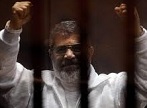
On Jan. 25, 2013 Egyptian protesters burn the HQ of the Muslim Brotherhood in Ismailia, Egypt, signaling the founding of the Black Bloc, causing Pres. Morsi to announce the formation of a White Bloc to counter it; on Jan. 26 riots in Port Said cause the police to kill 30 after 21 local soccer fans are given death sentences for a previous riot, while seven police officers are acquitted; on Jan. 27 Morsi declares a state of emergency in three major cities. On Feb. 2 anti-Morsi protests in Cairo, Egpt kill one and injure dozens. On Feb. 4 Egyptian anti-Morsi activist Mohammed El-Gindy (b. 1984) dies in Cairo after being tortured by police, causing yet more protests. On Mar. 2-3 U.S. secy. of state John Kerry visits Egypt, pledging $250M to support "democracy", cautioning Pres. Mohammed Morsi to heal political rifts. On May 28 Ethiopia announces a planned diversion of the Blue Nile to facilitate the new Renaissance Dam, causing Egyptian pres. Muhammad Morsi on May 28 to announce that Egypt won't allow their share of the Nile to be diminished by "one drop". On June 11 nearly 15M in Egypt sign an Anti-Morsi Petition to hold early pres. elections to oust him. On June 15 Egyptian pres. Mohammad Morsi attends a rally in Syria packed with hardcore Islamists that calls for jihad against the "infidels" (incl. non-Islamist Muslims and Shiites) in Syria, becoming the tipping point turning the army against him? On June 16 Egyptian pres. Mohammad Morsi appoints Adel el-Khayyat, a co-founder of Gamaa Islamiya, which claimed responsibility for the 1997 Luxor Massacre as gov. of Luxor, pissing-off the tourist industry. On June 21 tens of thousands of pro-Morsi Islamists demonstrate in Cairo, Egypt ahead of anti-Morsi protests. On June 23 a mob of Takfiri Sunni extremists in Abu Mussalam, Egypt near Cairo kills Shiite Sheikh Hassan Shehata and four followers. On June 23 Egyptian army chief Abdel-Fattah al-Sissi warns that the army will "not watch the country descend into uncontrollable conflict" or allow "an attack on the will of the people". On June 30 millions protest in Cairo, Egypt and other cities, calling for pres. (since June 30, 2012) Mohammed Morsi to resign, attacking the HQ of the Muslim Brotherhood; seven are killed incl. two in Cairo; U.S. ambassador to Egypt (since June 30, 2011) Anne Woods Patterson (1949-) is singled-out by the crowds for being to cozy with Mubarak and the Muslim Brotherhood; on July 1 the Egyptian army threatens to intervene in 48 hours and topple Morsi; on July 1-2 several Egyptian ministers resign incl. PM Hisham Qandil, while Pres. Obummer, er, Obama refuses to withdraw support for Morsi, saying he came to power in a "legitimate" election, putting U.S. Marines in Spain and Italy on standby to protect U.S. citizens on July 2, causing Morsi to rebuff the ultimatum, putting the country on edge; on July 3 Egyptian armed forces CIC and defense minister (since Aug. 12, 2012) Gen. Abdel Fatah Saeed Hussein Khalil el-Sisi (1954-) arrests and removes Morsi from power, suspending the Egyptian constitution, and making chief justice Adly Mahmoud Mansour (1945-) the interim pres. (until June 30, 2016); on July 3 the military shuts down three Islamist TV stations incl. one operated by the Muslim Brotherhood; on July 3 pissed-off Pres. Obama utters the soundbyte that he's "very concerned" about the overthrow, and is ordering his admin. to review U.S. military aid; on July 3 Syrian pres. Bashar al-Assad utters the soundbyte: "The summary of what is happening in Egypt is the fall of what is called political Islam"; on July 4 liberal Egyptian diplomat Mohamed ElBaradei says that he worked hard to convince Western powers to oust Morsi for bungling Egypt's transition to an inclusive democracy, and on July 6 he is named interim PM (until ?); meanwhile Egyptian-born al-Qaida leader Muhammad al-Zawahiri announces a jihad to save Morsi, and on July 5 tens of thousands of Islams begin protests in Cairo, which turn violent at night, killing 30 and injuring 1K+ throughout the country. On Aug. 14 (Bloody Wed.) the 2013 Rabaa Massacre sees Egyptian forces clear the pro-Morsi camps, killing 600-817 civilians incl. 149 in Rabaa al-Adawiya Square, causing Egyptian vice-pres. Mohammad ElBaradei to resign in protest; on Aug. 14 pissed-off Pres. Obama holds a press conference, and cancels joint military exercises; on Aug. 14-16 the Muslim Brotherhood attacks Coptic churches and monasteries throughout Egypt, incl. Gharbeya, Giza, Suez, Fayoum, Beni Suef, Minya, Asyut, Sohag, and Qena. On Aug. 14 the Al Nusra Battalion assassinates Col. Mohammed al Komi along the Cairo-Ismailia Rd. in Egypt as part of its program of killing "apostates" and "criminals".

On Jan. 28, 2014 after the military announces that they're backing him for pres., newly-promoted field marshal Abdel Fattah el-Sisi gives a speech, with the soundbyte: "Religious discourse is the greatest battle and challenge facing the Egyptian people, pointing to the need for a new vision and a modern, comprehensive understanding of the religion of Islam, rather than relying on a discourse that has not changed for 800 years", referring to the 1258 declaration by the mujtahids that the gates of ijtihad (independent reasoning on Islam) are closed, making him the new Martin Luther of Islam?; on Mar. 28 he resigns from the military and announces his candidacy for pres. On May 5 (eve.) Egyptian army chief Abdel-Fattah El-Sisi gives his first televised interview, saying that the Muslim Brotherhood is "finished" and will not return if he is elected, and that if elected he would respect the peace treaty with Israel and consider a state visit; "I see that the religious discourse in the entire Islamic world has cost Islam its humanity. This requires us, and for that matter all leaders, to review their positions", saying that there is no such thing as a "religious state"; on May 11 he utters the soundbyte: "If we are asked to make amendments to the peace treaty with Israel, we will do it", and that if Israel won't recognize the "state of Palestine" with capital in Jerusalem he will never visit Israel. On May 26-28 elections in Egypt give a V to Field Marshal Abdel Fattah Saeed Hussein Khalil el-Sisi (1954-), who on June 8 becomes Egyptian pres. #6 (until ?). On June 30 days after Ajnad Misr (Soldiers of Egypt) announces that it has planted bombs to target security forces, then aborts the mission due to concern for civilian safety, but is unable to remove them all, an explosion near the pres. palace in Heliopolis, Cairo, Egypt kills one police officer and injures several. On July 15 (9:00 a.m.) an Egyptian-brokered ceasefire begins, but Hamas continues to fire 50 rockets, causing the Israelis to retaliate at 3:00 p.m., ending the ceasefire; on July 15 Dror Hanin (b. 1975) is killed by a Hamas mortar shell while handing out gift bags to Israeli soldiers at the Erez Crossing near Gaza, becoming the first Israeli death. On Aug. 1 (Operation Protective Edge Day 25) Israel and Hamas agree to a 3-day humanitarian ceasefire as Egypt tries to broker a peace deal; too bad, less than three hours after it goes into effect, Hamas terrorists emerge from a tunnel, detonate a suicide bomb, then kill two Israeli soldiers and kidnap Israeli soldier 2nd Lt. Hadar Goldin, ending the ceasefire, with Benjamin Netanyahu telling John Kerry that "Hamas will pay", and telling the Obama admin. "not to ever second-guess me again", with Pres. Obama calling for the soldier to be "unconditionally released as soon as possible", with the soundbyte: "No country can tolerate missiles raining down on its cities... No country can or would tolerate tunnels being dug under their land"; on Aug. 1 the U.S. Senate passes legislation sponsored by Repub. leader Mitch McConnell allocating $225M for Israel's Iron Dome; meanwhile Israel continues destroying infiltration tunnels from Gaza; on Aug. 2 after the Israeli army triggers the Hannibal Protocol, killing 130 Palestinian civilians in Rafah to try to ensure that he doesn't remain in their hands, Goldin is confirmed dead? On Aug. 9 (12:01 a.m.) Israel and Hamas accept another 72-hour ceasefire, brokered by Egypt, who invites them to resume talks after 2K have been killed; on Aug. 13 a 5-day extension is announced; too bad, Hamas fires five rockets into Gaza 2 hours before the first ceasefire's scheduled end. On Aug. 10 the Egyptian supreme court dissolves the banned Muslim Brotherhood party, and orders its assets liquidated. On Aug. 25 the U.S. announces that Egypt and the UAE secretly launched air strikes against Islamist militias in Tripoli, Libya, keeping it from them. On Sept. 8 it is announced that Egyptian pres. Abdel Fattah al-Sisi has proposed that the Palestinians in Gaza move to a new 1.6K sq. km Palestinian state in Sinai and drop the demand to return to the 1967 borders. On Sept. 8 Sheikh Ahmed al-Tayeb, grand imam of Al-Azhar U. in Egypt denounces ISIS, calling its members "criminal tarnishing the image of Islam", and calling ISIS and allied groups "products of colonialism serving Zionism". On Oct. 22 Sinai-based Ansar Bait al-Maqdis terrorists attack and injure two Israeli soldiers near the Egyptian border. On Oct. 22 an explosion outside Cairo U. in Egypt injures nine incl. five policemen. On Oct. 24 a car bomb in Sinai Peninsula in Egypt kills 26 soldiers and injures 28 more; hours later three security forces are shot dead at a checkpoint near El Arish, causing Egypt to close the Gaza crossing until Nov. 26. On Nov. 29 former Egyptian pres. Hosni Mubarak is acquitted of murder and corruption charges. On Dec. 2 (dawn) ISIS stages its first-ever attack on an Egyptian missile ship at the N end of the Suez Canal 40nm N of Damietta.
On Jan. 1, 2015 Egyptian pres. Gen. Abdel Fattah al-Sisi gives a New Year's Day Speech, in which he calls for a reform of Islam, with the soundbyte that the "corpus of [Islamic] texts and ideas that we have sacralized over the years" are "antagonizing the entire world", and that it is not "possible that 1.6 billion people should want to kill the rest of the world's inhabitants so that they themselves may live"; also that the Muslim World "is being torn, is being destroyed, it is being lost - and it is being lost by our own hands." On Jan. 12 ISIS' Libyan branch announces the kidnapping of 21 Egyptians in Libya, which it calls "Christian Crusaders". On Jan. 28 a delegation of senior members of the Egyptian Muslim Brotherhood, plus two open Hamas supporters meet with Obama's State Dept. and with several U.S. senators to seek help in returning Mohamed Morsi to power. On Jan. 29 (night) ISIS attacks in El-Arish, Egypt and other towns in the Sinai Peninsula kill 25 and injure dozens. On Feb. 4 Egypt sentences 2013 secular activists in the 2011 uprising to life in prison incl. leader Ahmed Douma; 30 minors are sentenced to 10 years. On Feb. 9-10 amid the dust storms of Amshir, Russian PM Vladimir Putin visits Cairo, Egypt to talk with Gen. Abdel Fattah al-Sisis on enhancing their strategic partnership, viewing U.S. hegemony as a common enemy. On Feb. 15 ISIS releases a video claiming to show the beheading of 21 Egyptian Coptic Christians in Libya, pissing-off Egyptian pres. Abdel Fattah al-Sisi, who vows to respond; on Feb. 16 (dawn) Egyptian jets bomb ISIS targets in Libya; on Feb. 17 al-Sisis calls for U.N.-backed internat. intervention in Libya to fight ISIS, causing the U.N. Security Council to meet on Feb. 18, and the Arab states to call on it to lift the Libyan arms embargo; the start of WWIII? On Feb. 28 an Egyptian court declares Pres. Obama's alma mater Hamas a terrorist org.; another court sentences top Muslim Brotherhood leaders to life in prison over a violent clash in Cairo in June 2013; meanwhile Egypt keeps sealing off tunnels between Gaza and N Sinai, strangling Hamas and causing it to become like a cornered wild beast, denouncing Egypt and calling for the destruction of Israel; on June 6 the ruling branding Hamas a terrorist group is overturned. On Mar. 2 a bomb explosion outside the Egyptian supreme court bldg. in Cairo, Egypt kills two and injures nine incl. seven policemen. On Mar. 31 Pres. Obama ends his 2013 arms embargo on Egypt, authorizing $1.3B in U.S. weapons. On Apr. 2 coordinated Islamist attacks against five military posts in Sheikh Zuweid City in N Sinai kill 10 Egyptian soldiers and injure 17. On Apr. 21 Egypt sentences ex-pres. Mohamed Morsi to 20 years in prison for ordering the imprisonment and torture of prisoners during his presidency; his former chief of staff Refaa al-Tahtawi is given three years in prison for abuse of power. On Apr. 26 (Sun.) ousted Egyptian pres. Hosni Mubarak utters the soundbyte that there are "fateful decision" that need to be made by pres. Abdel-Fattah Al-Sisi, and that Egyptians should stand behind him. On May 16 former Egyptian pres. Mohammad Mursi and 105 other members of the Muslim Brotherhood incl. Yusuf al-Qaradawi are sentenced to death in connection with a mass jailbreak in 2011, causing jihadists to warn the world to expect a backlash, while the U.S. and Turkey condemns Egypt, and the EU denounces Egypt, calling the trial flawed and "not in line with Egypt's obligations under international law"; hours after the verdict is announced, Muslim Brotherhood terrorists kill two Egyptian judges and Egypt's top prosecutor N of El-Arish, Egypt in the Sinai Peninsula, also killing a driver and injuring another prosecutor; ex-special forces cmdr. turned terrorist Hisham al-Ashmawy is suspected; on May 21 ISIS threatens the Egyptian death sentence judges with er, death; on May 27 159 pro-Muslim Brotherhood clerics and 10 pro-MB religious bodies post a document on the Internet calling for the overthrow of the al-Sisi regime and return of Morsi to power; on June 16 after consultations with the Egyptian Grand Mufti, Morsi's death sentence is upheld, along with five others incl. Mohammed Badie. On June 8-12 the Center for the Study of Islam and Democracy (CSID) sponsors a conference in Washington, D.C. held by the Obama admin. that incl. members of the Muslim Brotherhood, causing Egypt to ask U.S. ambassador Stephen Beecroft to answer for it in Cairo. On June 9 (night) ISIS affiliate Sinai Province fires rockets at the U.N. airport in Sinai Province (Ansar Bayt Al-Maqdis), Egypt. On June 10 a suicide bomber detonates steps away from the ancient Egyptian Temple of Karnak in Luxor, Egypt, after which two gunmen arrive and are killed by police after wounding four incl. two policemen, becoming the first Islamist attack on Luxor since Nov. 17, 1997. On June 22 Egypt announces the appointment of a new ambassador to Israel, Hazem Hayrath (1957-), becoming the first since Atef Salem in Nov. 2012, who was recalled by Pres. Mohamed Morsi to protest Israel's Gaza operation. On June 22 Egyptian security forces kill 22 suspected terrorists near Sheikh Zuwayed, North Sinai, Egypt. On June 29 a car bomb attack on a convoy in Cairo, Egypt kills chief prosecutor Hisham Barakat. On July 1 a wave of 15 simultaneous Islamist attacks in Sinai Peninsula, Egypt kills 100+ militants and 50 soldiers, causing Egypt to retaliate with F-16 air strikes. On July 24 ISIS hits an Egyptian patrol ship with a rocket in the Mediterranean Sea off N Sinai, setting it on fire. On July 25 Egypt makes its first trial run of its 45-mi. Suez Canal Axis, designed to speed-up traffic. On July 28 top Egyptian Sunni Muslim scholar Yusuf al-Qaradawi issues a post on his Web site reversing his support of suicide bombers for those under Israeli occupation, saying that they should only use rockets, missiles, and mortars. On July 30 Saudi Arabia and Egypt sign the 2015 Cairo Declaration, a military-economic pact to help them fight Iran and ISIS incl. a joint Arab military force for regional crises and mutual investment in energy and transport. On Aug. 20 (early a.m.) a large car bomb explodes near a nat. security bldg. in Shubra, Cairo, Egypt, injuring six. On Oct. 1 an ISIS roadside bomb in El-Arish, Egypt in N Sinai kills two Egyptian soldiers and injures 16. On Oct. 29-30 a Summit on Syria in Vienna, Austria is attended by the U.S., U.K., France, Germany, Egypt, Jordan, Qatar, Saudi Arabia, Turkey, UAE, and Iran; the Syrian press. pub. an article that claims that U.S. secy. of state John Kerry acted as a mediator and blocked a discussion of the removal of Bashar al-Assad, and that Iranian foreign minister Javad Zarif was the dominant player. On Oct. 31 Russian Kogalymavia Flight 7K9268 (Airbus A-321) en route from Sharm el-Sheikh, Egypt to St. Petersburg, Russia carrying 224 passengers and crew crashes in Sinai Peninsula, Egypt, killing all aboard; ISIS claims responsibility, which Russia denies, after which U.S. intel chief James Clapper utters the soundbyte that there is "no direct evidence" pointing to ISIS, but he wouldn't rule it out; investigations point to an on-board bomb, and after Pres. Obama announces that a bomb is suspected, and flight data recorder data confirm it, Russian pres. Vladimir Putin halts Russian air traffic with Egypt and evacuates Russian nationals; meanwhile Egypt suspends flights for British nationals; on Nov. 17 Russia announces that the plane was indeed brought down by a homemade bomb equivalent to 2 lbs. of TNT, and offers a $50M reward for info. on the terrorists. On Nov. 5 the U.N. Gen. Assembly votes 117-21 to allow Israel to join the Committee on Peaceful Uses of Outer Space; Egypt votes for Israel for the first time since 1948. On Nov. 17 Russia announces that the plane down on Oct. 31 in the Sinai Peninsula was downed by a bomb that was equivalent to 2 lbs. of TNT, and offers a $50M reward; meanwhile ISIS releases a photo they claim is of the bomb, which fits in a pineapple juice can. On Dec. 4 a firebomb attack at a nightclub in Cairo, Egypt kills 16 and injures three.
In 2015 the Zohr Gas Field off the coast of Egypt is discovered by an Italian co., with estimates of up to 3T cu. of gas, becoming the largest discovery in the Mediterranean region, 30% larger than the Israeli Leviathan Gas Field.
On Jan. 4, 2016 Egypt resumes diplomatic relations with Israel for the first time since Nov. 2012; meanwhile Egypt's invasion of Sinai to fight ISIS violates their 1979 treaty with Israel, destabilizing relations. On Jan. 7 gunmen fire at security personnel at a hotel in Haram, Giza, Egypt during the annual Coptic celebration of Christmas. On Jan. 7 Israel's Shin Bet intel service announces that it foiled a Hamas plan to kidnap and kill Israelis; meanwhile Egypt contacts Israel, requesting them not to normalize ties with Turkey. On Jan. 18 Libyan former intel official Ahmad Qadhaf Al-Dam gives an interview to Egyptian Dream TV Network, claiming that ISIS and other Islamist terrorist groups have gotten hold of the chemical weapons left by dead duck dictator Muammar Qaddafi. On Jan. 19 Chinese pres. Xi Jinping visits Saudi Arabia for two days, meeting with King Salman to discuss trade and other ties, after which he continues to Egypt and Iran (until Jan. 23). On Mar. 13 Egyptian justice minister (since 2015) Ahmed El-Zend is sacked for alleged blasphemy by the statement: "Even if he was a prophet, peace and blessings be upon him." On Mar. 28 58-y.-o. Egyptian Seif Eddin Mastafa (1957-) hijacks an EgyptAir flight en route from Cairo to Alexandria with a fake suicide belt, diverting the plane to Cyprus before being arrested; it was all about love for his Cypriot ex-wife? On Apr. 9 Saudi King Salman visits Egypt; Egyptian pres. Abdul Fatah Sisi transfers control of the strategic Red Sea islands of Sanafir and Tiran to him. On May 18 (night) EgyptAir Flight 804 crashes into the Mediterranean with 66 aboard. In May a Hamas-Fatah Reconciliation Initiative is announced by Egypt, Jordan, Saudi Arabia, and UAE. On Oct. 8 the U.N. Security Council votes on a Russian draft resolution on the Aleppo situation, proposing a political rather than military solution; Egypt votes for, and Saudi Arabia votes against, exposing their rift. On Oct. 22 Egyptian brig. gen. Adel Rajaei (b. 1964) is assassinated outside his home in Oubour City (near Cairo). On Dec. 9 a bomb attack near the pyramids in Giza, Egypt at a police checkpoint kills six policemen; on Dec. 12 an explotion at a Coptic cathedral in Cairo kills 22 and injures 35. On Dec. 23 (one hour before Sabbath on the U.S. East Coast) after Egypt withdraws it under pressure from Israel, and the backstabbing Obama admin. breaks with tradition and abstains, giving the green light, the U.N. Security Council votes 14-0-1 (incl. New Zealand, Malaysia, Senegal, and Venezuela) to adopt U.N. Security Council Resolution 2334, demanding an end to Israeli settlements in E Jerusalem, affecting 500K, standing and applauding afterwards to rub it in, pissing-off Donald Trump, who tweets: "As to the U.N., things will be different after Jan. 20th"; on Dec. 24 Israeli PM Benjamin Netanyahu calls it a "shameful ambush"; Am. Jewish leader Alan Dershowitz finally turns on Obama, calling him the worst president ever, with the soundbyte: "He called me into the Oval Office before the election and said to me, 'Alan, I want your support. And I have to tell you, I will always have Israel's back.' I didn't realize that what he meant was that he'd... stab them in the back"; U.S. Sen. (R-S.C.) (2003-) Lindsey Graham, chmn. of the Subcommittee on Foreign Operations of the Senate Appropriations Committee utters the soundbyte that Obama "has gone from naive and foolish to flat-out reckless", adding: "With friends like these, Israel doesn't need any enemies", threatening to defund the U.N.; the first time a U.S. pres. abstains on a U.N. anti-Israel resolution during his last month in office; on Jan. 16 Trump gives an interview to Steve Kroft of 60 Minutes, admitting that he ordered the abstention vote, with the soundbyte: "I don't think it caused a major rupture in relations between the United States and Israel. If you're saying that Prime Minister Netanyahu got fired up, he's been fired up repeatedly during the course of my presidency."
On Apr. 3, 2017 Pres. Trump meets in the White House with Egyptian pres. Abdel Fattah el-Sisi, promising a U.S. military buildup "probably more than ever before", and praising him as doing a "fantastic job", promising "strong support" for battling terrorism. On Apr. 9 (Palm Sun.) two Coptic Christian churches in Tanta and Alexandria, Egypt are bombed, killing 25 and injuring 60 in St. George's Church in Tanta, and killing 11 and injuring 35 in St. Mark's Cathedral in Alexandria; Egyptian pres. Abdel-Fattah El-Sisi declares a 3-mo. state of emergency; ISIS claims responsibility; on Apr 10 police kill seven of the terrorists in a shootout in Assiut, Upper Egypt; on Apr. 10, 2018 a military court in Alexandria sentences 36 perps to death out of 48 defendants, 17 of which are fugitives. On May 2 (a.m.) 95-y.-o. Prince Philip of Britain (b. 1921) announces his retirement from royal duties stating in the fall. On May 2 (Israel's 69th Independence Day) UNESCO by 22-10-23 passes a resolution calling Israel an "occupying power" in Jerusalem, submitted by Muslim nations Algeria, Egypt, Lebanon, Morocco, Oman, Qatar, and Sudan, pissing-off Israeli PM Benjamin Netanyahu, who utters the soundbyte: "The absurd decisions n UNESCO have to not merely be reduced in the number of their supporters. That's happening. I'm glad to say, went down from 32 to 26, today to 22. There are more countries today that are abstaining or supporting Israel than there are those opposing Israel. But my goal is to have no votes in UNESCO on Israel." On May 26 masked Islamist gunmen attack a group of Coptic Christians traveling in Minya Province, Egypt en route to pray at the Monastery of St. Samuel the Confessor, killing 26 and injuring 26, incl. many children. On Sept. 12 an ISIS ambush of a convoy in Sinai Peninsula, Egypt kills 18 police officers and injures seven. On Dec. 6 (70 years 7 days after the U.N. vote to create Israel on Nov. 29, 1947) (3 days shy of the centenary of the British conquest of Jerusalem from the Ottomans) after signing the semi-annual waiver of the 1995 U.S. Jerusalem Embassy Act on Dec. 4, despite dire warnings from Muslim and Euro leaders incl. the EU, U.K., Egypt, Abdullah II of Jordan, Saudi King Salman, who calls it "a flagrant provocation of Muslims all over the world", Hamas, which threatens to "open the gates of Hell", and Recep Tayyip Erdogan of Turkey, who calls it a "grave mistake", and warns "Jerusalem is our red line", Pres. Trump announces that the U.S. is recognizing Jerusalem as Israel's capital and that he is ordering the U.S. embassy in Tel Aviv to move there, keeping a campaign promise no matter how much flak results; wasting no time, on Dec. 6 Hamas issues a call for a Day of Rage on Dec. 8, which incl. protests in Indonesia and Malaysia. On Dec. 18 an Egyptian-sponsored U.N. Security Council draft resolution to require Pres. Trump to rescind his recognition of Jerusalem as Israel's capital is vetoed by the U.S., with U.S. ambassador Nikki Haley calling it an insult that won't be forgotten; the vote is 14-1; on Dec. 20 Pres. Trump threatens to cut off financial aid to countries that vote in favor of a draft resolution submitted by Yemen and Turkey. On Dec. 29 Muslim terrorists attack the Mar Mina Church in Cairo, Egypt, killing 8-10 incl. three police officers and wounding 5+ more before one terrorist wearing a suicide vest is killed.
On Jan. 1, 2018 (1:30 a..m.) a Muslim gunman kills two Copts celebrating New Year in an alcohol shop in Giza, Egypt. On Feb. 9 Egypt launches Operation Sinai 2018 to purge the region of Islamist terrorists. On Feb. 11 U.S. secy. of state Rex Tillerson arrives in Cairo, Egypt to kick off a tour of five Middle Eastern countries; meanwhile Egypt launches an offensive against Islamist militants in the Sinai Peninsula. On Mar. 24 a bomb explodes near convoy carrying the city's security chief Gen. Mostafa al-Nimr in the C Roshdi district of Alexandria, Egypt, killing two policeman and injuring four more, along with one civilian. On Mar. 26-28 pres. elections in Egypt are a V for 1st-term incumbent pres. Abdel Fattah al-Sisi, with 92% of the vote, vs. 3% for runner-up Moussa Mostafa Moussa; 23M of Egypt's 60M voters turn out, plus 2M write-in ballots; stability tops voters' concerns; women and elderly men have high participation rates. In Mar. Egypt Face is launched in Egypt as the Egyptian version of Facebook. On May 8 the French newspaper Le Monde pub. the Manifesto Against the New Anti-Semitism signed by 300 French public figures incl. Nicolas Sarkozy, in which they "ask that the verses of the Qu'ran calling for the killing and punishment of Jews, Christians and unbelievers be obsoleted by theological authorities; on May 10 Abbas Shuman, deputy chief El Azhar U. in Cairo, Egypt responds with the soundbyte: "No to freezing one letter from the Koran, and those calling for it can go to Hell!" On Nov. 2 Muslim gunmen ambush three buses carrying Christian Coptic pilgrims en route to a remote desert monastery S of Cairo, Egypt, killing seven and wounding 19; ISIS claims responsibility.